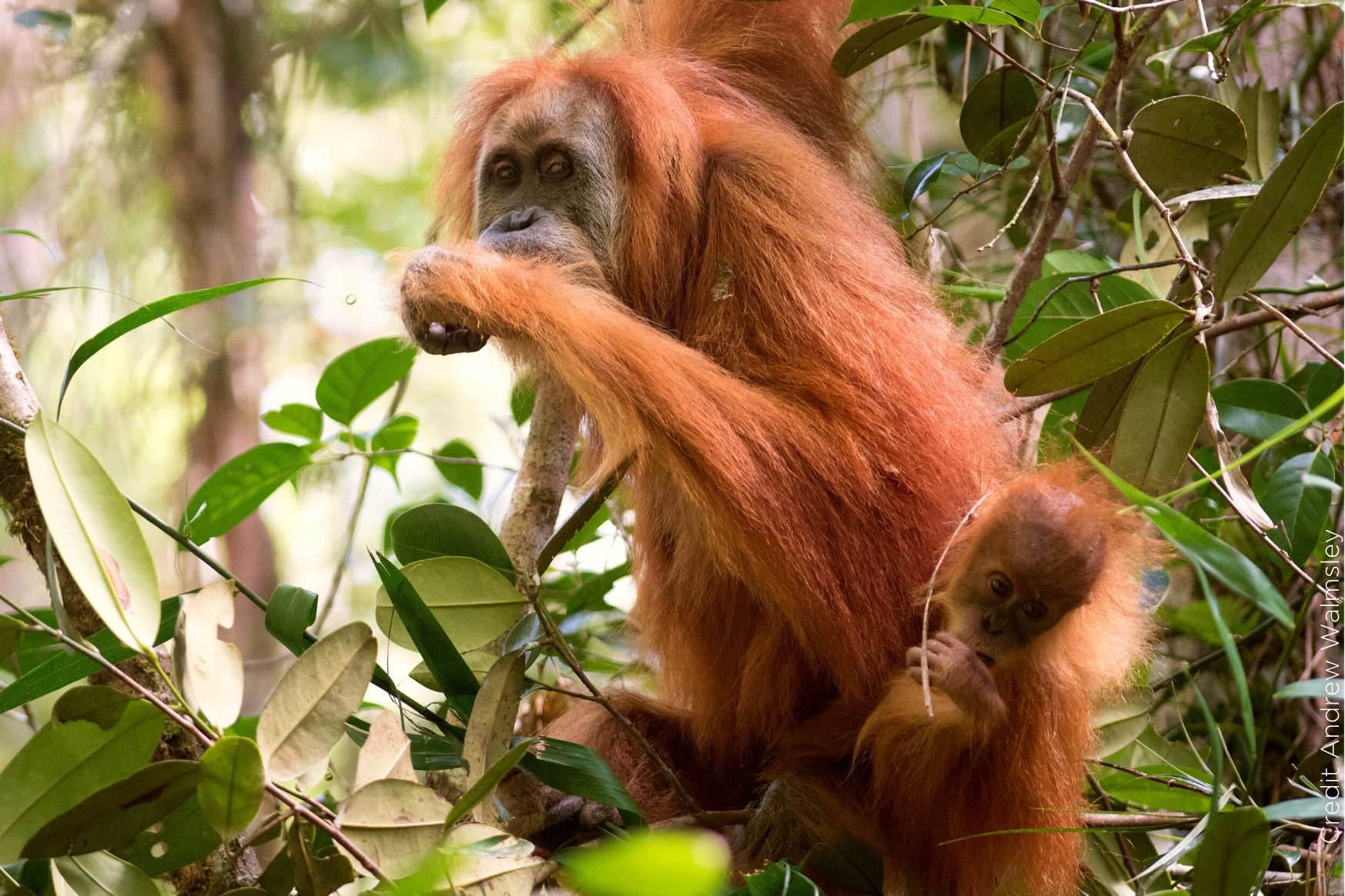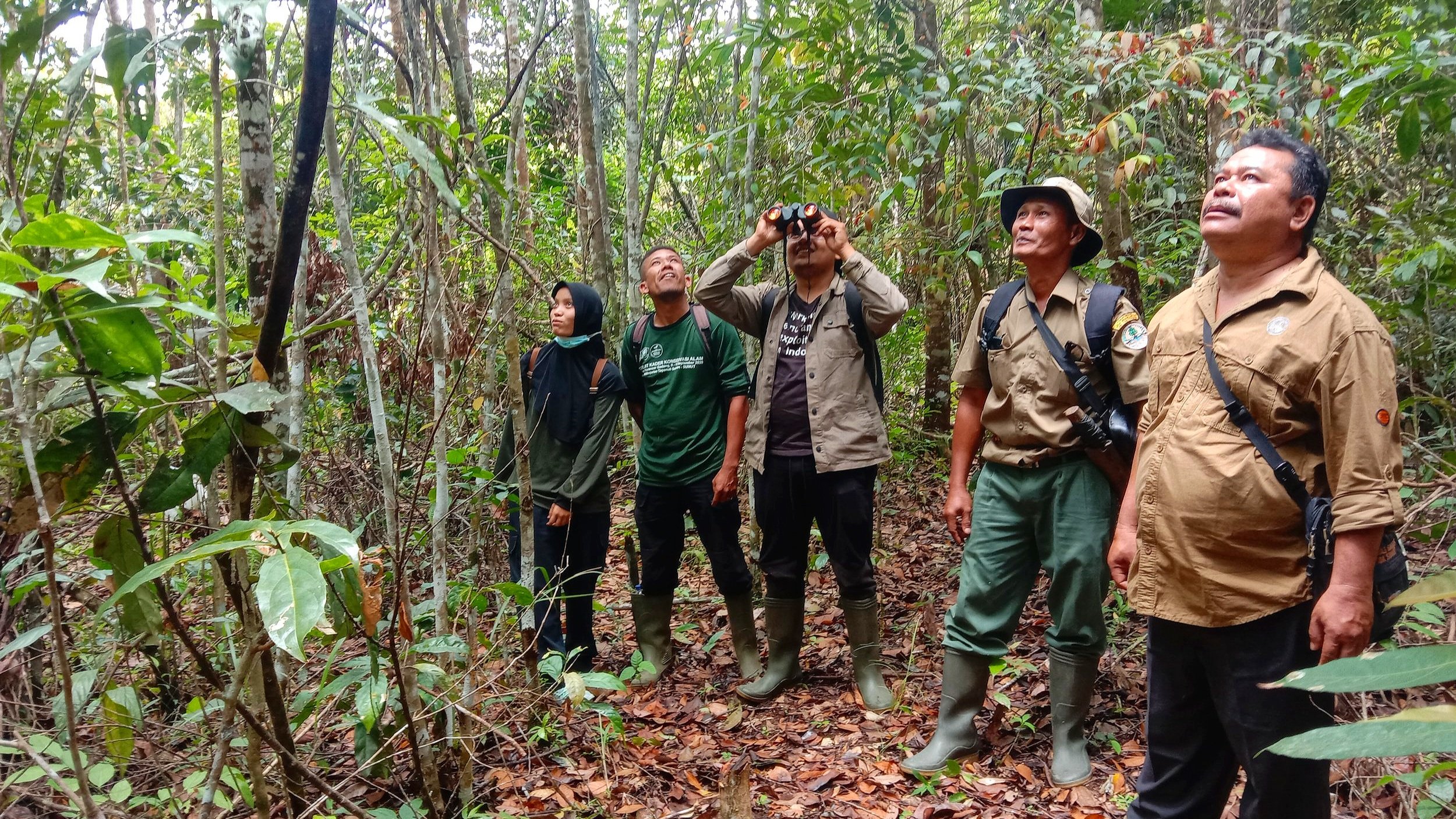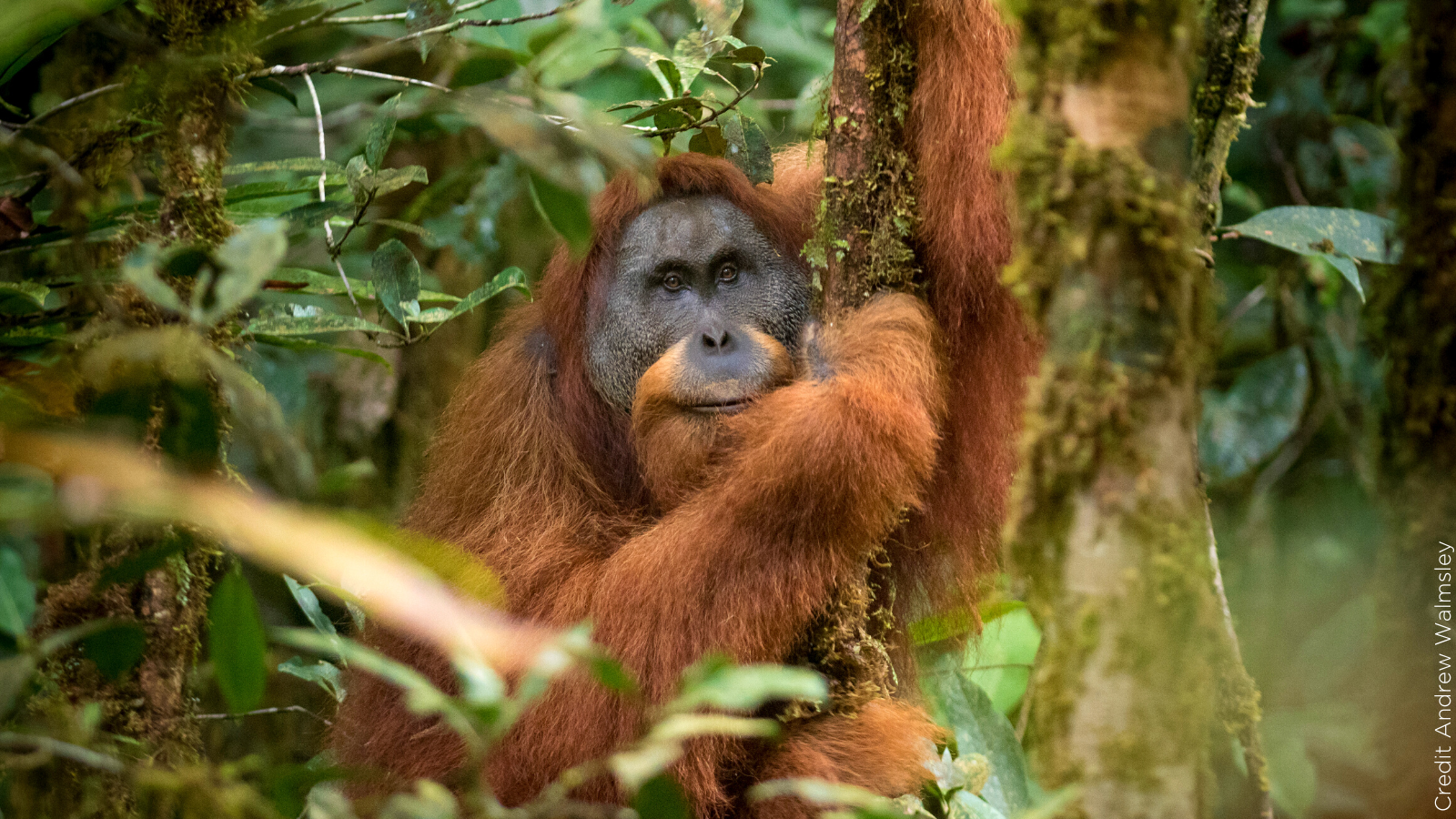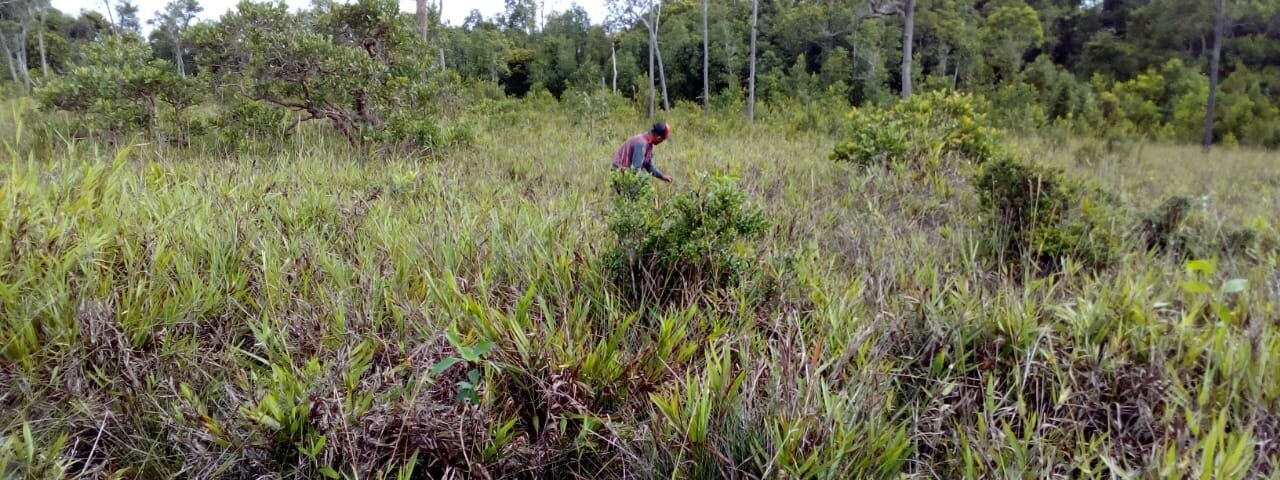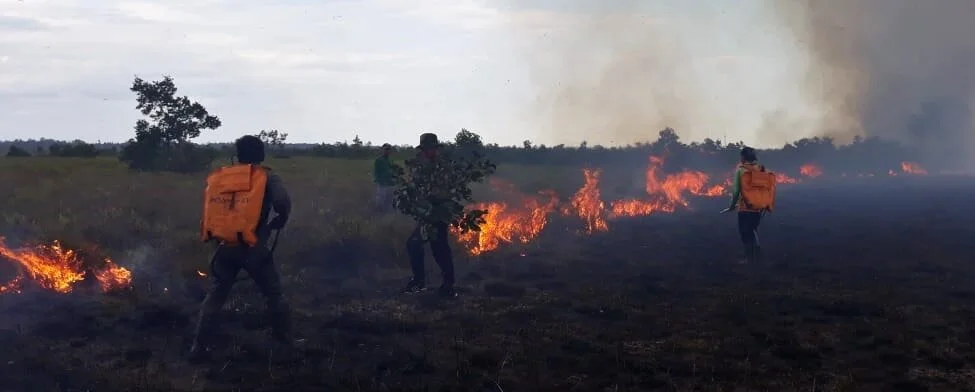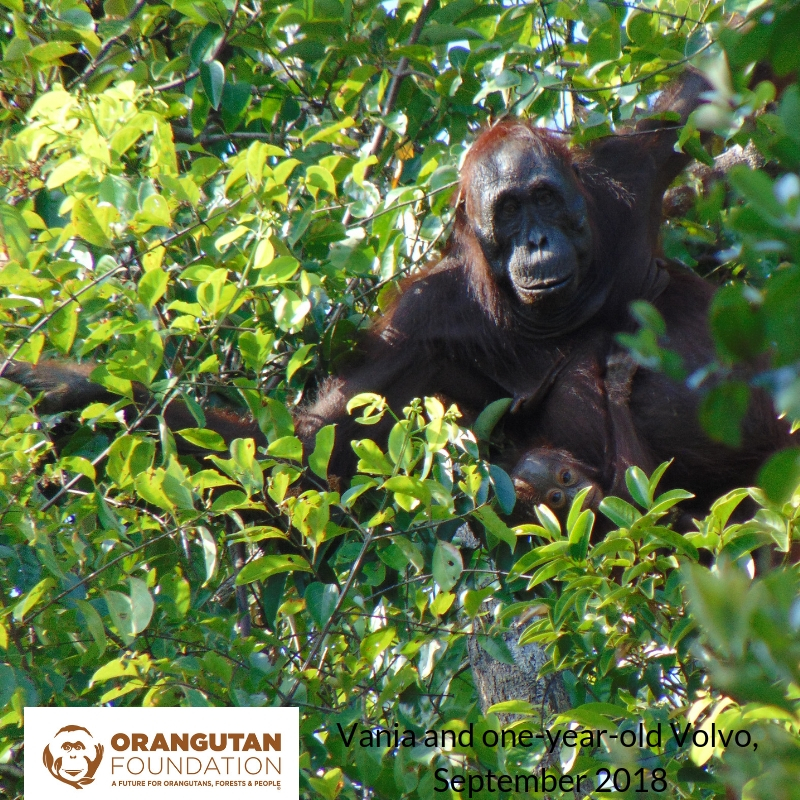The use of drones has been on the rise - they have become critical in conservation, enhancing our habitat protection efforts and changing the way we work.
Saving the most endangered great ape - the Tapanuli orangutan
With only 800 individuals remaining in the wild, the Tapanuli orangutan is the rarest species of great ape. Their home in the mountainous forest of Batang Toru, Northern Sumatra, spans around 250,000 acres but is heavily fragmented due to habitat loss. Consequently, this means that the Tapanuli orangutan is also the most vulnerable of the great apes to become extinct.
We’re determined to provide a future for all orangutans, but as the Tapanuli’s forest is located far from our local programmes in Central Kalimantan, Indonesian Borneo, we’ve called upon a dedicated team who can help us.
Scorpion - The Wildlife Trade Monitoring Group, are a local NGO in Sumatra whose primary focus is to tackle animal exploitation by working with government and nearby communities. As their main goals match those of Orangutan Foundation, we could think of no one better suited to help us ensure a safer future for the Tapanuli orangutan, and here are three successful approaches that they use to do this:
1) Patrols. With the help of local law enforcement, patrol teams regularly visit 11 sites in the Batang Toru region which are orangutan habitats or areas of suspected illegal activity. It can be daunting prospect to explore a remote patch of rainforest which may harbour illegal loggers, miners, or wildlife traffickers, but it’s a necessary task to deter such destructive activity.
So far the team have caught illegal loggers felling trees for timber, reported man-made shelters in the forest which are likely used by hunters, and even uncovered patches of forest within nature reserves that have been cleared to make way for illegal plantations. All destructive behaviours which if left unfound, would destroy vast areas of orangutan habitat.
2) Investigations. As a result of these patrols, and by cooperating with local communities and government, the team can investigate these offenses further to thwart more habitat encroachment.
In some cases they have been able to identify names of loggers and ensure that previously used camps within protected areas have been abandoned. These surveys are ongoing, but to date have ensured that a dozen or so sites of illegal activity are no longer used.
3) Awareness. It’s paramount that we spread the word and remind local communities that their surrounding forests are essential for Tapanuli orangutans, and this has been communicated in a number of ways in the Batang Toru region.
Agriculture is the primary livelihood for many local people so instructive talks and discussions have helped encourage nearby villages to reduce the spread of their farmland into protected areas. Interestingly, the team have also incorporated the message into Friday prayers in mosques and Sunday sermons in churches to emphasise the matter and raise awareness to over 300 villagers. This is a unique approach but one that is proving to have a positive impact on the local perception of orangutans and their forests.
Despite major difficulties from the emergence of the global pandemic, the Scorpion team have worked wonders to protect the Batang Toru ecosystem. Through our partnership so far the team have helped strengthen over 15,000 hectares of strict conservation area, providing a safer forest for Tapanuli orangutans and encouraging better relations with local people for the future. From their findings it’s clear that habitat loss and encroachment will continue to be a major hurdle, but there are at least effective ways of resolving this with the right support.
Stewards of the forest
The protection and restoration of tropical forest habitat remains at the core of ensuring a future for orangutans, not to mention the thousands of other species that rely on one of the planet’s most diverse ecosystems. Fortunately amidst the current climate, our guard post and habitat restoration staff are still hard at work.
By conducting regular patrols, guard posts can monitor and protect orangutan habitat.
Our guard posts continue to record wildlife sightings as they conduct routine patrols on the river and through the forests of the Lamandau Wildlife Reserve. This is an effective strategy to prevent illegal activities such as logging, mining and fishing from occurring within the reserve.
By planting new saplings around forest peripheries, we can restore orangutan habitat previously lost in forest fires. In particular from the large fires of 2015 which decimated vast areas of vegetation.
As well as protecting existing forest, restoring degraded areas of habitat is key to the survival of orangutans and to combat the effects of climate change. Last month from our plant nursery the habitat restoration team carefully chose 16,500 seedlings to be replanted in the Lamandau Wildlife Reserve. The selection process for every sapling is critical as there are a number of factors to take into account before they can be planted in the wild, and it can take many years for tree saplings to grow to a forest canopy level.
Firstly, our team ensure that each plant in the nursery is growing straight, has reached the minimum height, and has green and healthy leaves before they can be delicately transported to their planting site. It then takes time for each sapling to acclimatise to direct sunlight in the nursery. This adjustment will ensure that saplings have the best possible chance to mature into trees which one day could form part of the high forest canopy.
The nine different species chosen by our team are more fire-resistant and therefore have the best chance to regenerate forest that has been destroyed. Selecting the location for each species is also a crucial factor as the soil, water level and surrounding vegetation all influence how the saplings will develop. We will continue to monitor the progress of these saplings and hope that they can form part of the surrounding Lamandau Wildlife Reserve.
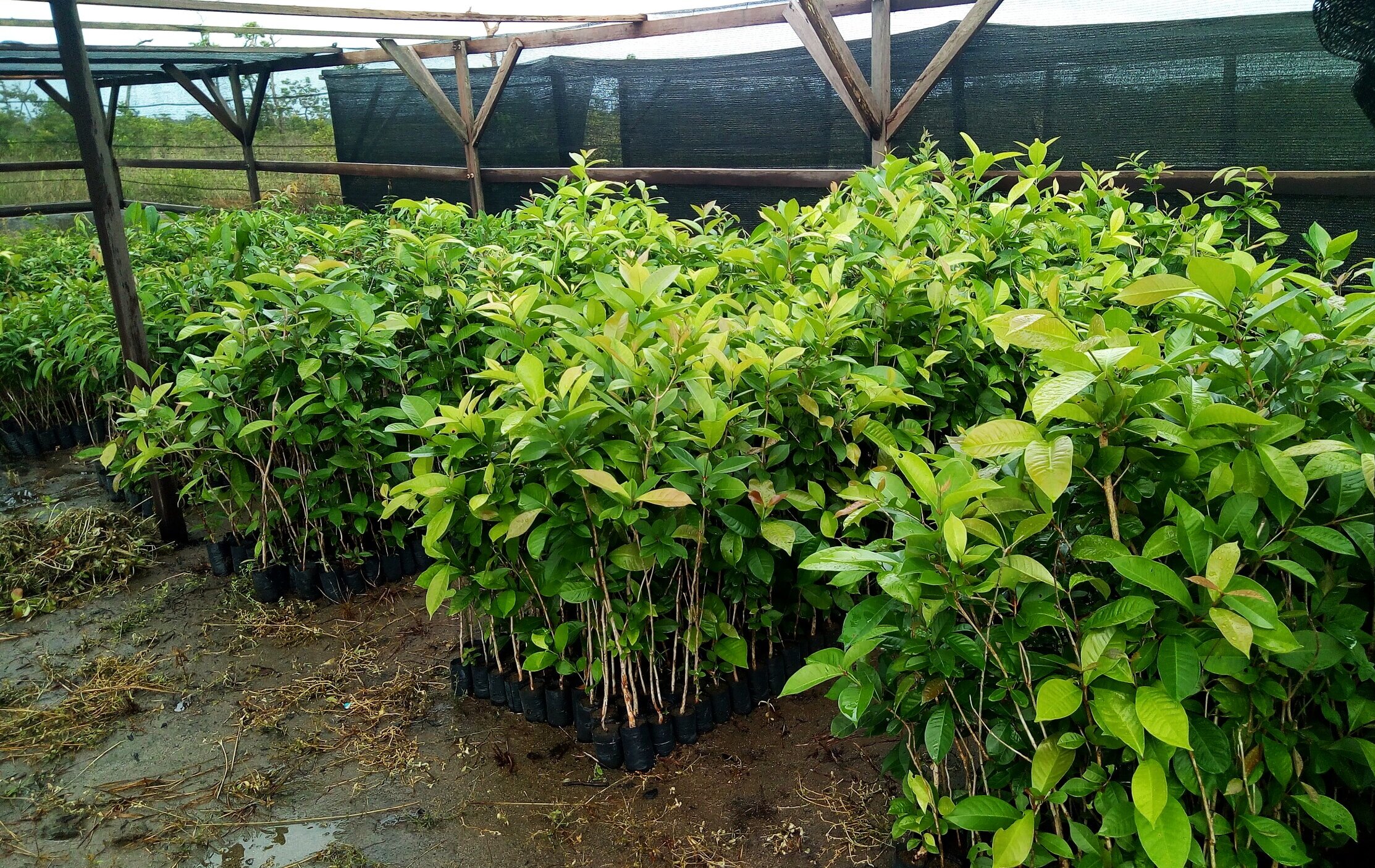
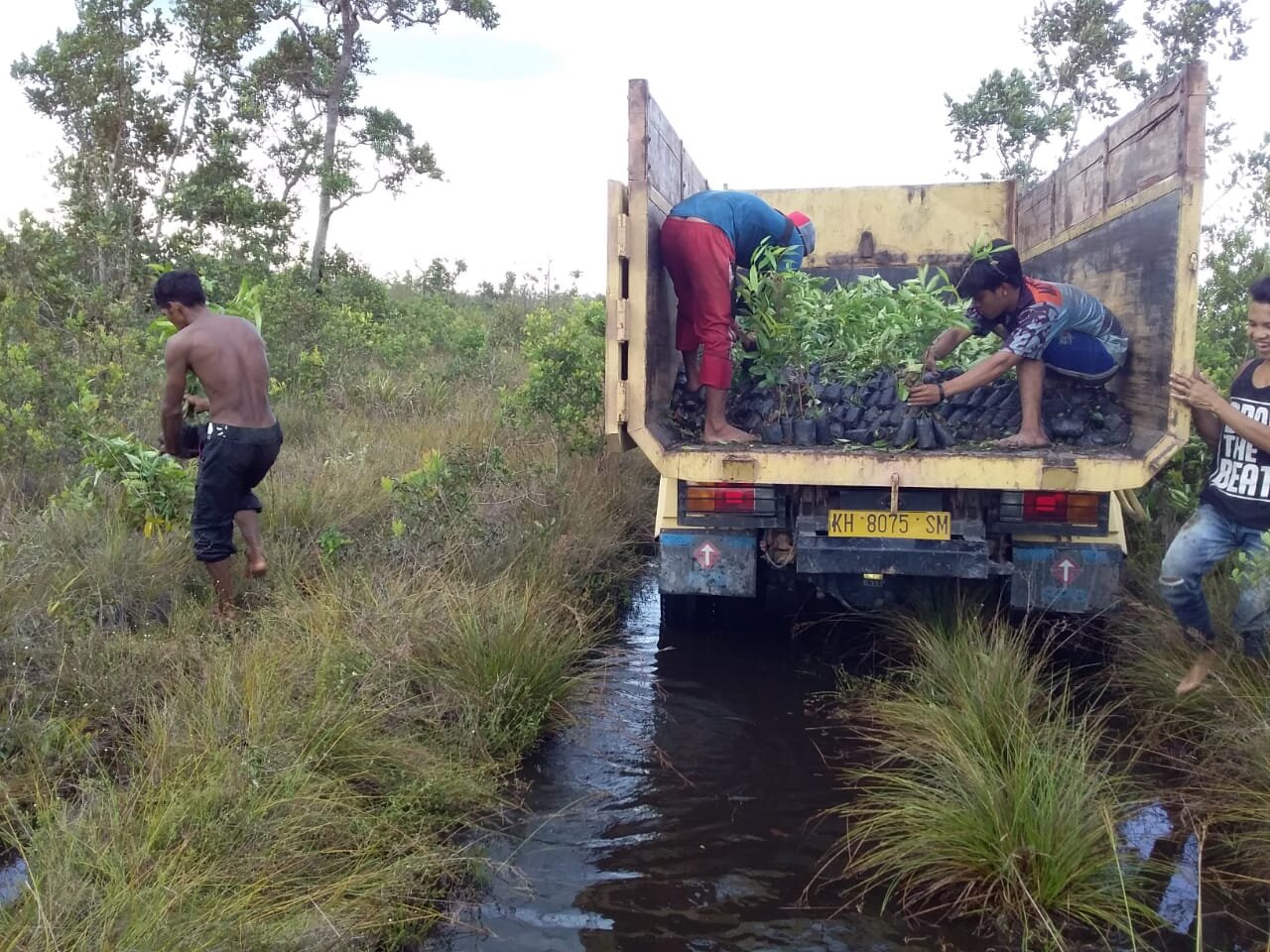
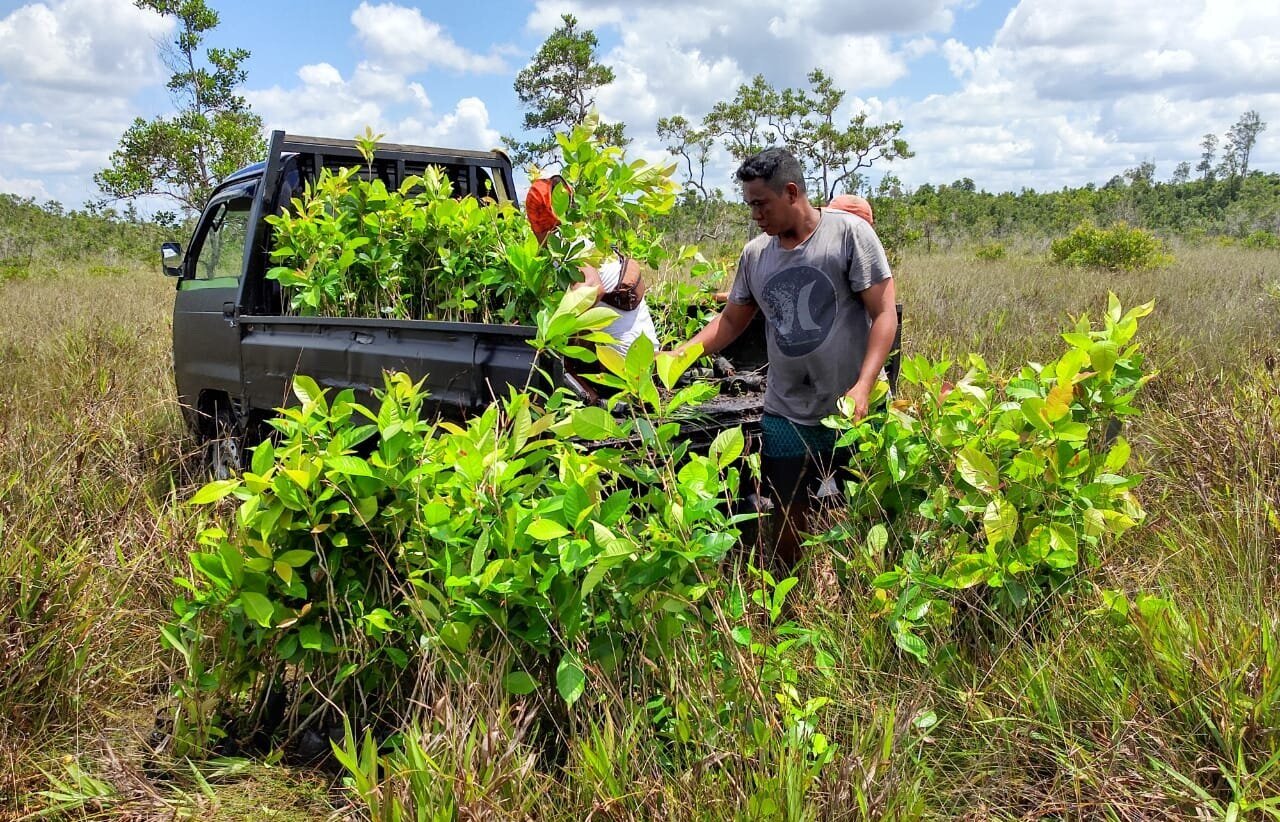
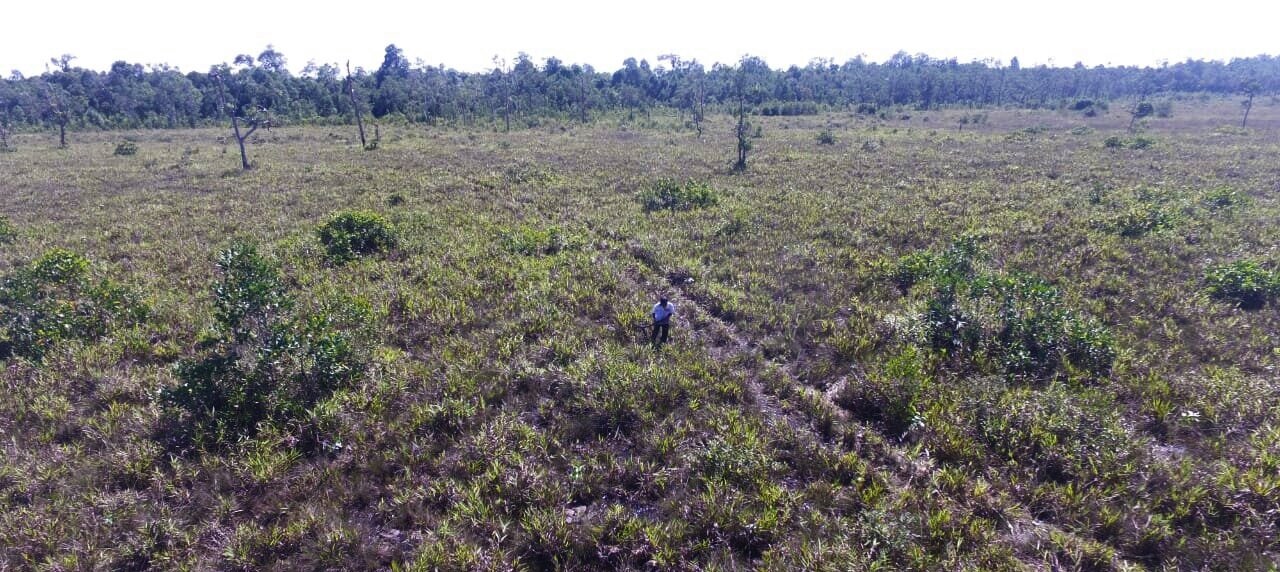
While activities in many parts of the world are currently at a standstill, we are proud that our staff in the field are largely able to persevere with our ongoing conservation programmes. You can help guarantee that these vital programmes continue by participating in a fundraising activity of your choice on Sunday 26th April through the 2.6 Challenge- an event you can complete at home to help UK charities.
Alternatively, you can support our work directly by sponsoring an acre of forest or purchasing an e-gift donation towards our programmes below.
Fires burn as the dry season continues
As the UK Summer fades into Autumn, in Indonesia, the dry season is still in full swing. Dry conditions have created an environment that enables fires to spread quickly across the land, and as reported extensively in the media, recent fires across South East Asia have contributed to a blanket of haze that currently hovers over much of the subcontinent.
These fires are often the result of traditional farming methods. Towards the end of a dry season, farmers in this part of the world will routinely use a slash and burn agricultural technique to clear their land and provide better conditions for crop regeneration. Local communities may also use this method in order to create clearings so that they can hunt for deer or wild boar, however in particularly dry years, these fires can burn out of control for prolonged periods of time and contribute to the levels of haze that have been reported in recent weeks.
The Lamandau Wildlife Reserve in Indonesian Borneo is an area of forest protected by Orangutan Foundation, but it’s western region has been subject to fires during this dry spell which can creep into the reserve. Our field teams and guard post staff have worked with locals officials on occasion into the night to battle the flames and stop the spreading. They continue to be on high alert for any potential fires before the much-needed rains come, but we are indebted to their efforts in protecting this vital wildlife refuge.
Fortunately this reserve and the significant orangutan population in it’s interior are under protection from skilled government and Orangutan Foundation staff who are trained and equipped to prevent outbreaks of fire, however their operations would not be possible without ongoing support. To become a Guardian of the Lamandau and help protect this ecologically rich environment all year round, please support our work by exploring the link below.
How guard posts play a crucial role in orangutan conservation
At the Orangutan Foundation, two main areas of orangutan forest habitat where we work are Tanjung Puting National Park and the Lamandau Wildlife Reserve in Indonesian Borneo. Together they cover over half a million acres of forest- almost twice the size of Hong Kong. It’s therefore essential that the Foundation’s guard post teams are skilled and well trained to monitor the forest and waterways within this vast area.
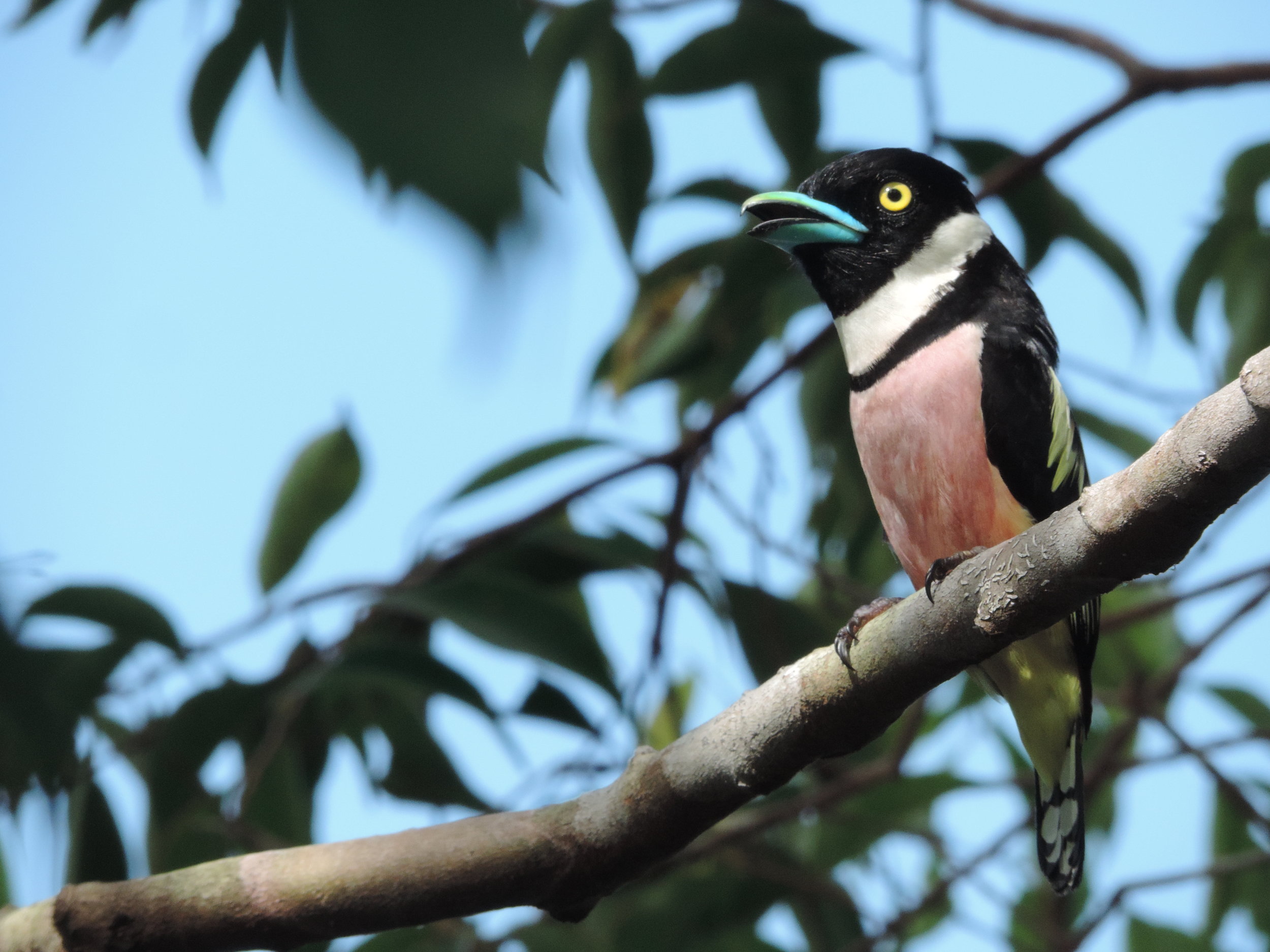
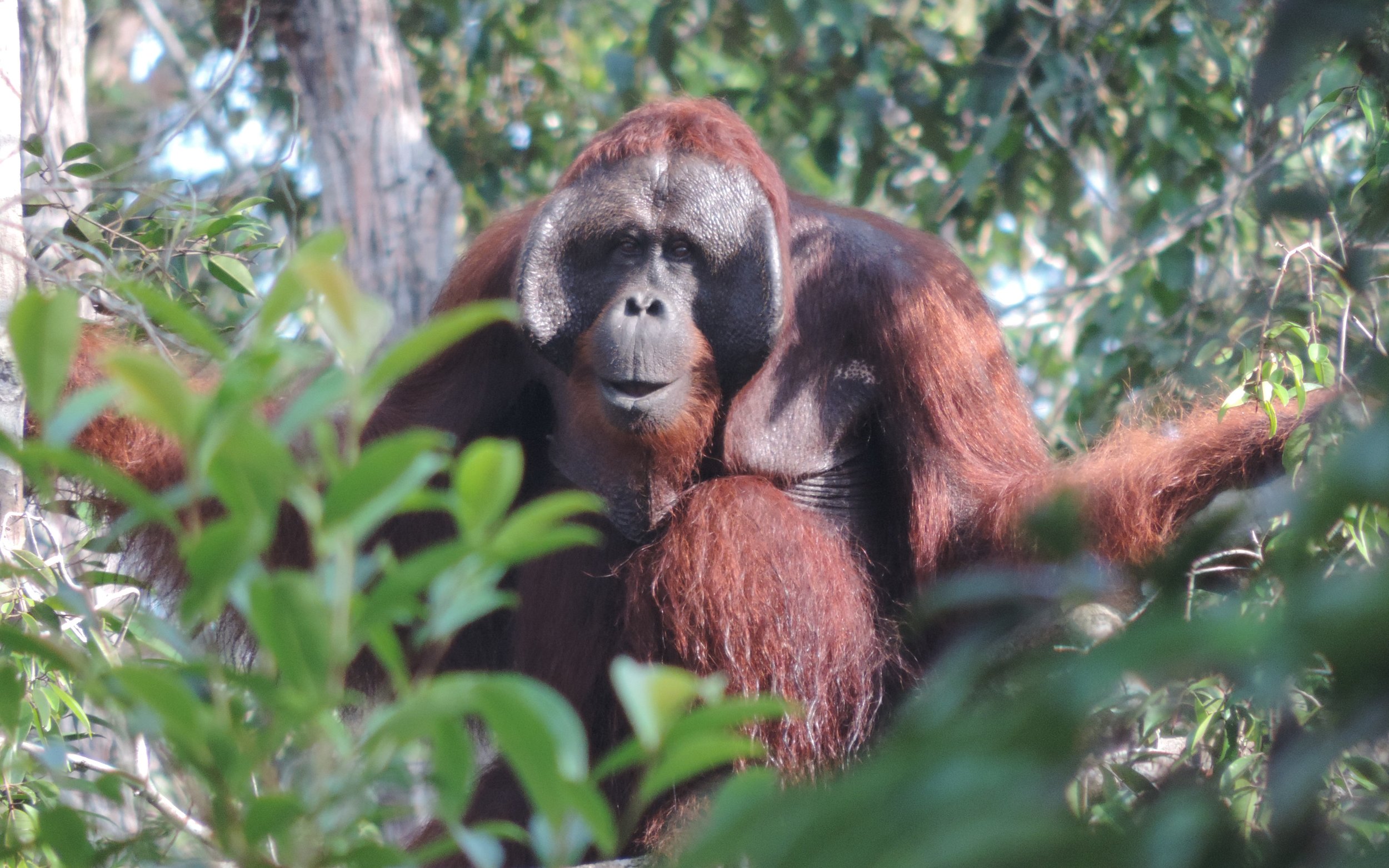
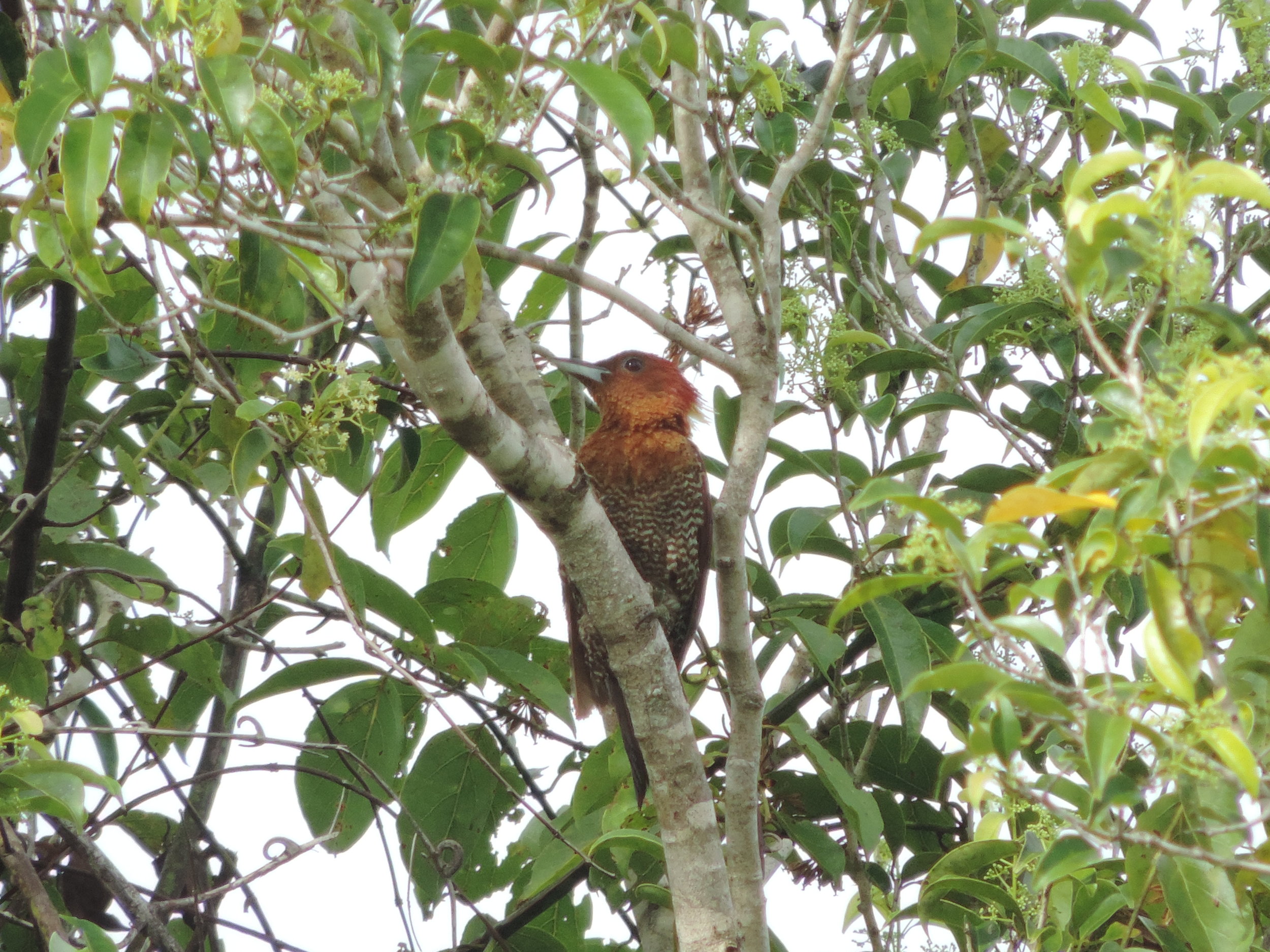
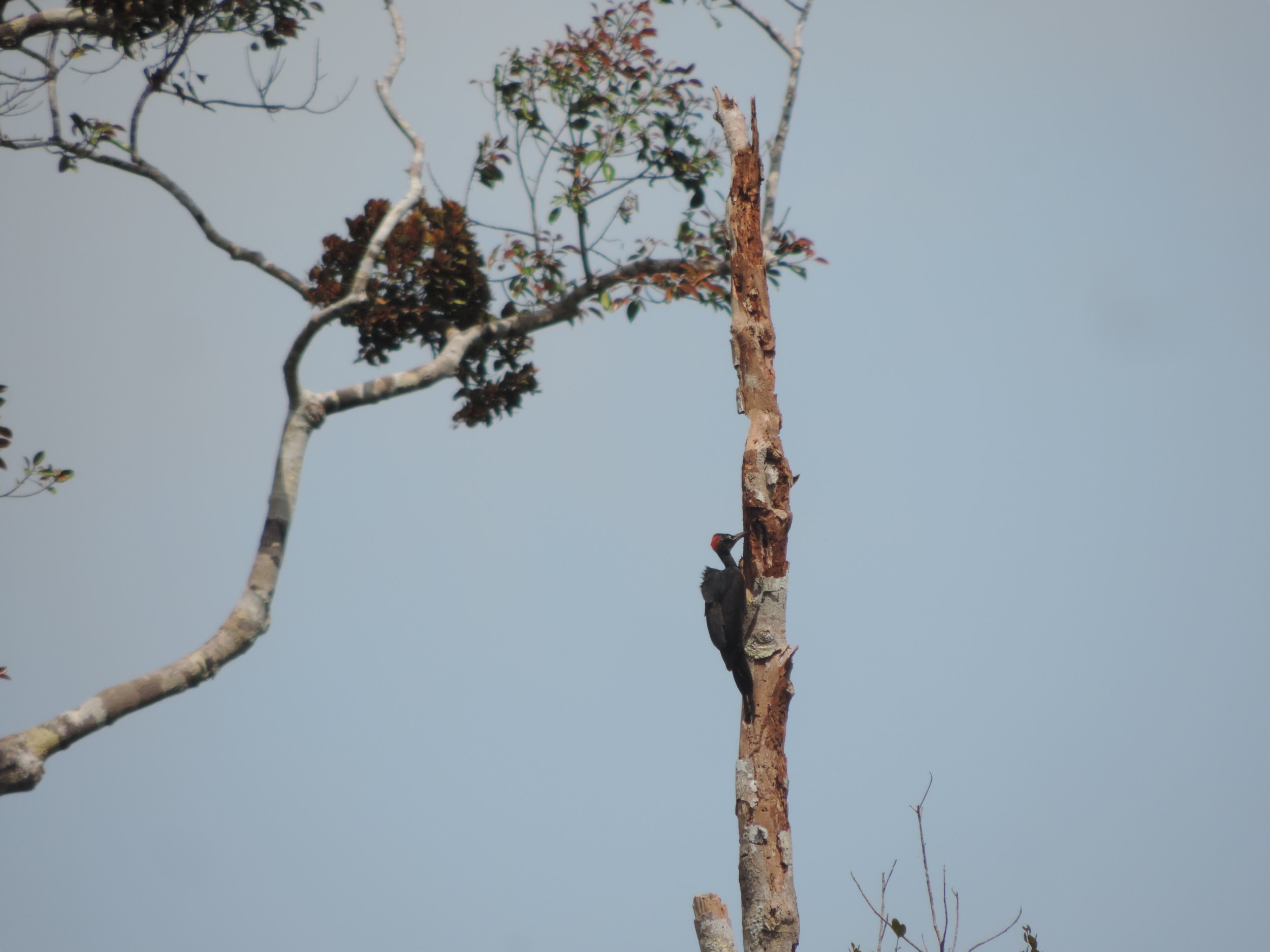
During regular patrols, the team record wildlife sightings like these recent images from Tanjung Puting National Park.
Habitat loss is the largest threat to orangutan populations today; for example, it is predicted that by 2080, between 70-80% of prime orangutan habitat will be lost in Borneo alone if current trends continue. The role of guard posts as a deterrent therefore is vital to ensure intruders do not encroach or enter these parks illegally, damaging or degrading the environment which is essential for orangutans and other wildlife.
Fire fighting is another important role in the field that make these outpost sites so vital. Each one is prepared with fire fighting equipment, and the Foundation works closely with training and supporting the team to be vigilant in spotting forest fires and then safely extinguishing them with as little damage to the habitat as possible. These fires are a potential threat year on year, in 2015 for example an area the size of Wales was lost to forest fires alone in Indonesia, so to have our team patrolling these sites is of paramount importance to orangutan protection and the surrounding area.
We are incredibly grateful to have such a skilled and hardworking team here at the Orangutan Foundation, but they still require support. Find out how you can help from as little as £2.
Hope for orangutans and their forest home
The Indonesian government has announced a presidential instruction, which ordered ministers and regional administrations to ban issuing permits for new plantations for the next three years. We welcome this much needed action. Orangutans can survive, if given a second chance.
Three years ago, in September 2015, we rescued an adult orangutan and her 6-year-old from an oil-palm plantation, which they had entered to escape raging forest fires. Our rescue team managed to capture both orangutans. They named the mother Vania and her offspring Venty. They were released into the protected Lamandau Wildlife Reserve, Central Kalimantan, Indonesian Borneo.
In 2017, Vania was spotted with a newborn, who we named Volvo. Venty, now aged 8-years-old, was still around too.
This month, field staff at Camp Buluh, in the wildlife reserve, saw Venty (image below) by herself in a tree. They then saw Vania with her very healthy looking one-year-old Volvo.
These orangutans live in a protected area, which is guarded and patrolled by Orangutan Foundation. However, 80% of wild orangutans live outside protected areas. This 3-year ban on plantation expansion is the life-line this critically endangered species need.
Please DONATE to support our work.
Thank you.
Celebrating new life whilst battling to save orangutan habitat
This week, our Monday motivation was this incredible footage of orangutan Max with her infant Monti, sent by our staff who are as excited about this new addition as we are. However, the next day, we heard from our Patrol Manager, Jakir, that fires were once again raging close to the Lamandau Wildlife Reserve, Indonesian Borneo. One moment we are celebrating new life, the next we are battling to save the habitat.
Thankfully the wildlife reserve is 158,000 acres in size and the fires are well away from the orangutan release camps. Our 8 manned guard posts, around the reserve, means our patrol staff can respond quickly to keep the reserve safe and prevent the fires from spreading.
Habitat protection is our priority. Please donate to our appeal to help us keep forests standing and orangutans in the wild.
Rescued and released orangutans of Lamandau Wildlife Reserve
Our vet, Dimas and programme manager, Iman, have been on their weekly visits to the orangutan release camps in the Lamandau Wildlife Reserve, Central Kalimantan, Indonesian Borneo. They check on the orphaned young orangutans and ensure the good health of the released orangutans. Their journey took longer than usual because the river levels are very low, due to lack of rain. Instead of travelling by speedboat it was completed in a shallow longboat (or klotok, as they’re called in Indonesia). Our youngest orangutans are cared for at Camp JL and include Timtom, Nyunyu, Adib, Mona (photo below) and Boy. Dimas gave them their multivitamin injection to keep them healthy but they are all well and active.
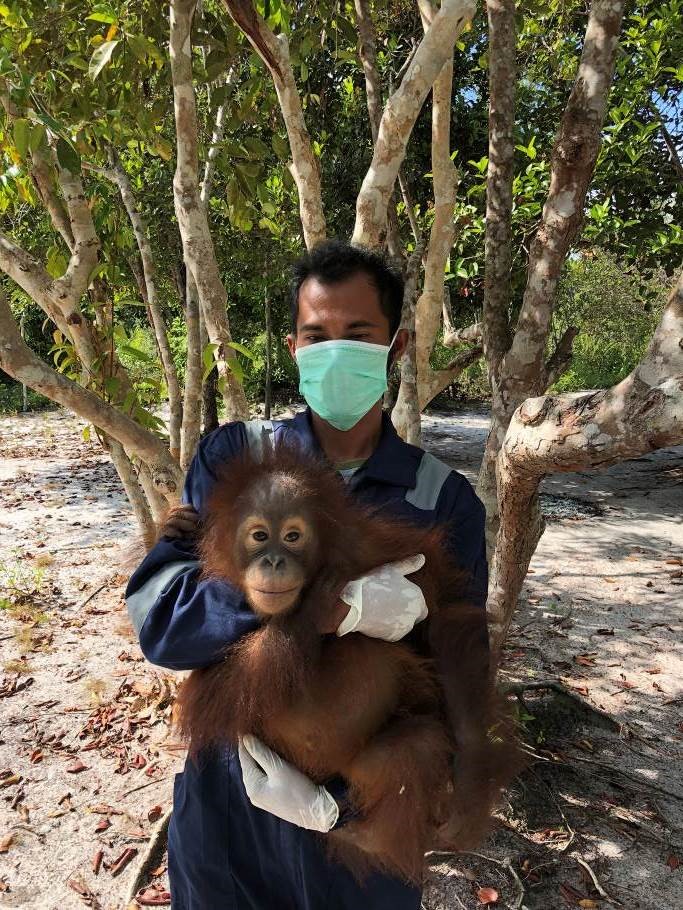
In the afternoon they continued by longboat to Gemini Camp. This is where blind orangutan Aan lives. Aan was shot and can never be returned to the wild. Her enclosure recently had new ropes (see below).
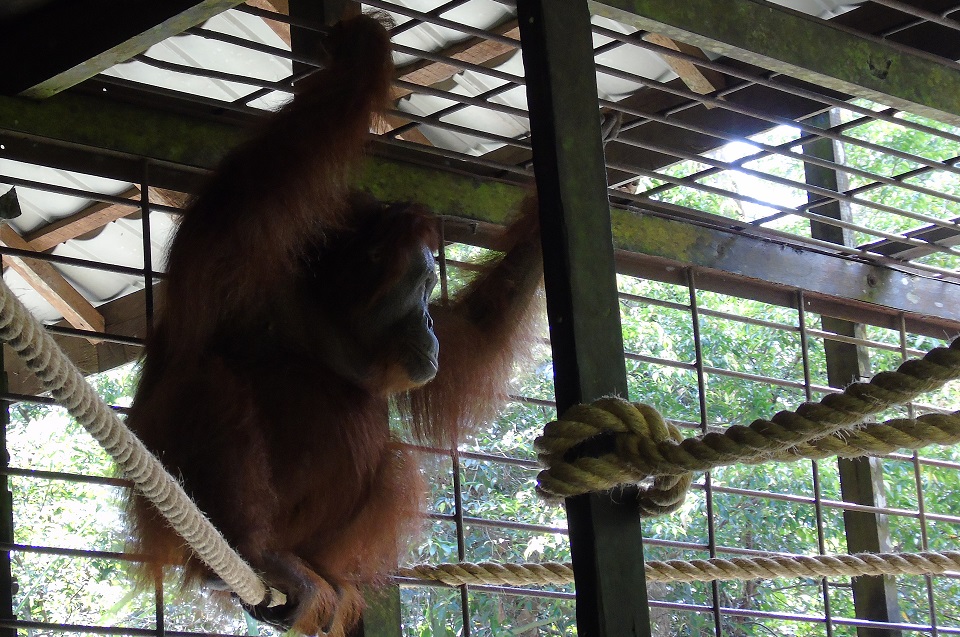
They walked from camp through the forest to the feeding site, where supplementary fruit is provided. Dominant male, Bangkal came to feeding along with female and infant orangutans; Ilik and Izzy; Hola and Happy; Ebony and Ekon (photos below); and Passion and Paris. Max was also seen with her newborn infant, now named Monti and they seemed well.
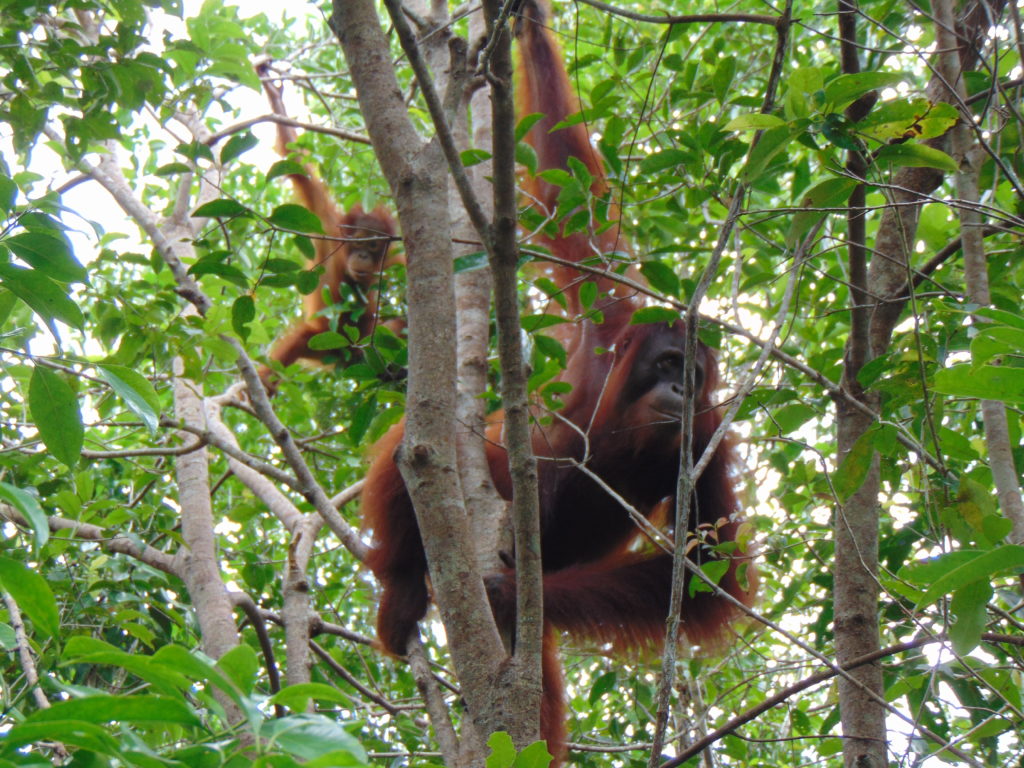
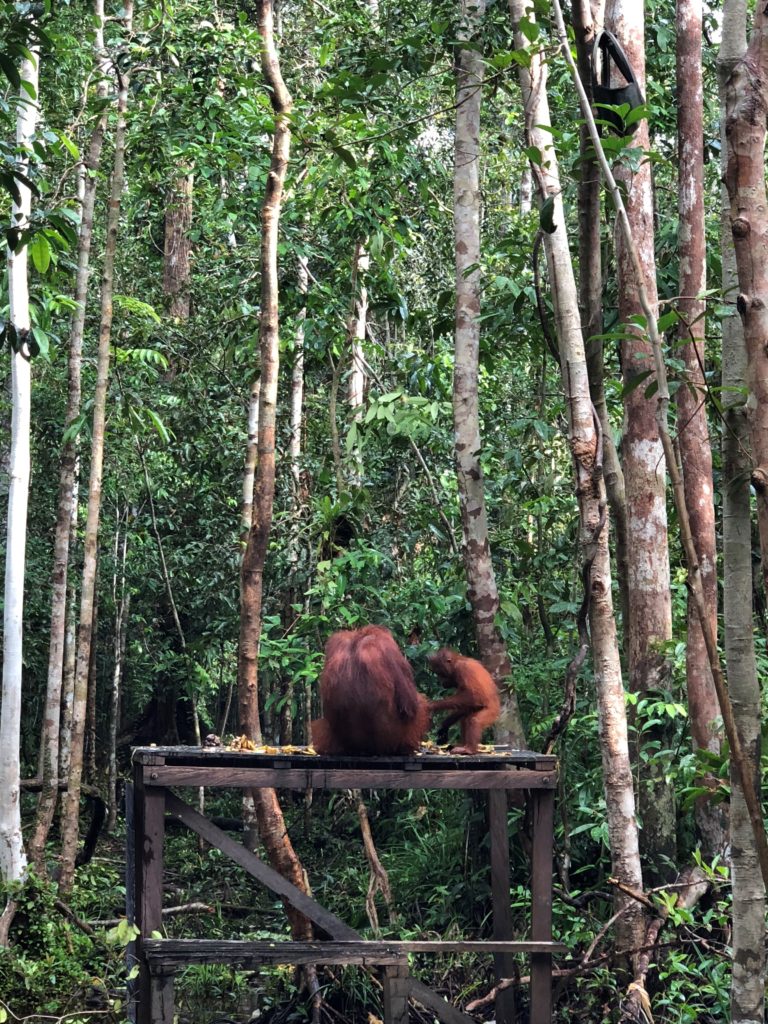
A few days later they went to Camp Buluh, to check on orphan orangutans Okto and Syifa. Okto had injured one of his fingers a few weeks ago but after receiving treatment the inflammation has reduced and is healing well.

Both Okto and Syifa very active and enjoy playing together. Okto was given a final anti-inflammatory injection and both orangutans received their multivitamins.
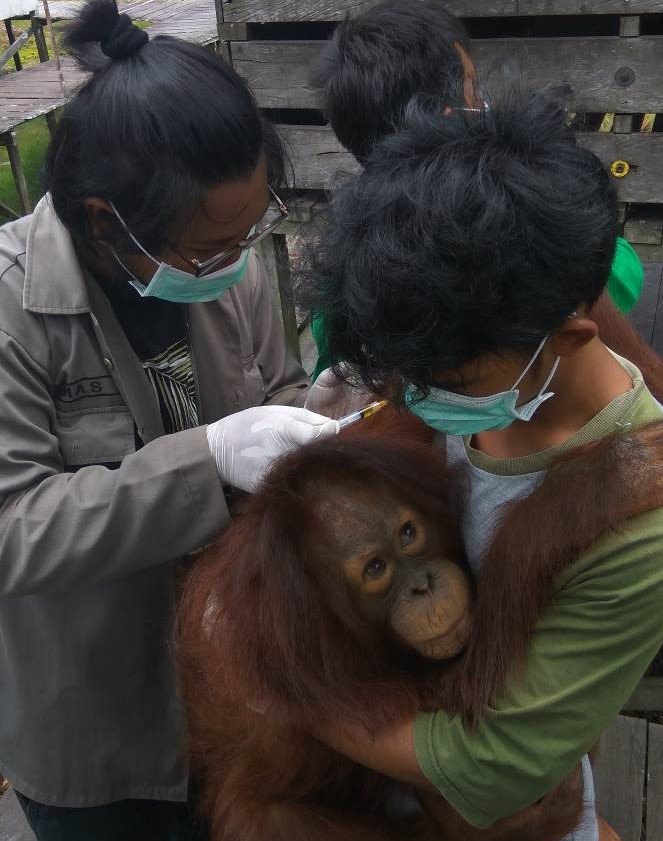
Conditions are very dry at present and so our guard post staff are vigilant and on alert for fires. All the guard posts are equipment with fire-fighting gear and our staff are trained enabling them to respond quickly and effectively to extinguish fires.
Please help us to keep forests standing and orangutans in the wild. You can support our work by donating or adopting Okto or Mona.
Protecting orangutan habitat
We only send out appeals when there is a real need for help – and right now, we urgently need funds to strengthen the protection of the Lamandau Wildlife Reserve, habitat of the critically endangered orangutan. In January and February, our forest patrol staff detected and tackled fires, deliberately lit to clear land, next to the reserve. They prevented the fires from spreading and saved thousands of acres of peat swamp forest from going up in smoke. In March, we met with the provincial government to push for those responsible for starting the fires, to be held to account.
The Lamandau Wildlife Reserve totals 158,144 acres of tropical forest. The Foundation's staff put themselves at risk as they battled to protect the forests, home to a population of 500 orangutans. Half of these were reintroduced or translocated by the Orangutan Foundation and given a second chance of survival in the wild. We must make sure they are safe.
It costs a quarter of a million pounds a year to protect the reserve and the wildlife. A significant commitment for a small charity, but a relatively small amount considering the invaluable riches and services the forests contain and provide.
The Orangutan Foundation runs and staffs eight guard posts in and around Lamandau to deter and prevent access to the forests. Our staff, all committed local Indonesian conservationists, patrol on foot or by boat. We use conservation drones and GIS to map and document illegal activities.
The map below shows the guard posts (red triangle on blue).
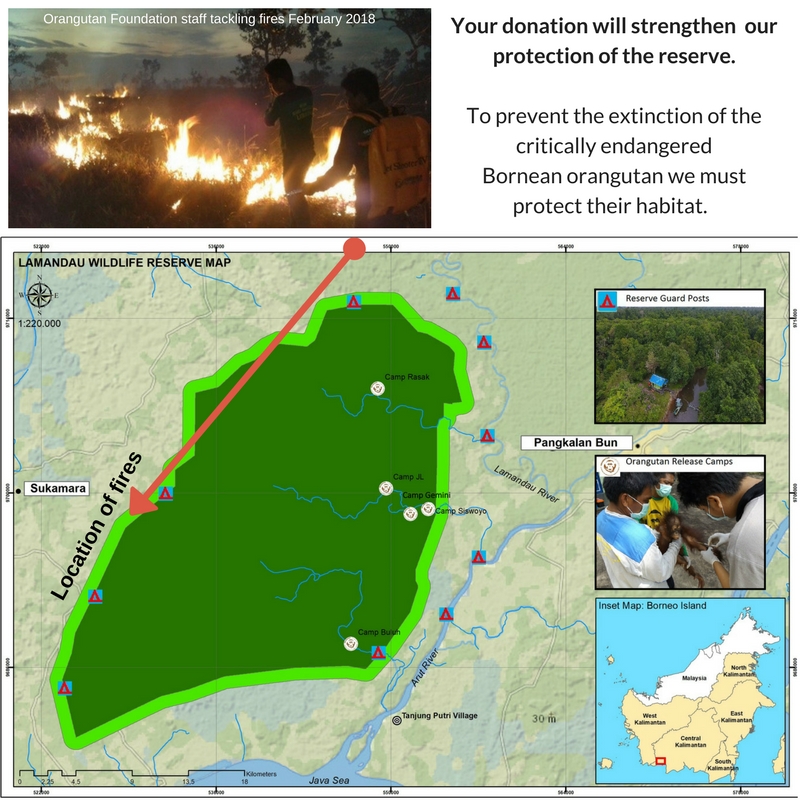
In 2017, we stopped illegal mining inside the reserve and since the beginning of 2018, our forest patrols have detected and stopped two cases of illegal logging.
Yet, despite years of investment in successful community awareness, there remain a small few who want to exploit the forest for their own interests. As pressure for land increases our fight to protect standing forest, to stop it being logged or converted to oil palm, will only become more difficult. Protecting Lamandau is an ongoing commitment: we cannot temporarily close a guard post due to insufficient funds, in the hope that we might start up again next year. If we stop protecting the reserve, we know that we will lose it: the forest and its precious wildlife could be gone in an instant.
Bangkal is one of the orangutans at risk. Originally released into the neighbouring Tanjung Puting National Park, Bangkal was severely injured in 2000 when illegal loggers attacked him with boiling-hot oil. Following a long period of recovery, he was released into Lamandau, at Camp Gemini, one of our five release camps in the reserve. Bangkal, now strong, healthy and independent, has since become the dominant male.Aan, an adult female, was shot and permanently blinded in an oil-palm plantation. Foundation staff moved Aan to the Lamandau Reserve, where she now lives with round-the-clock monitoring by our staff and vet.
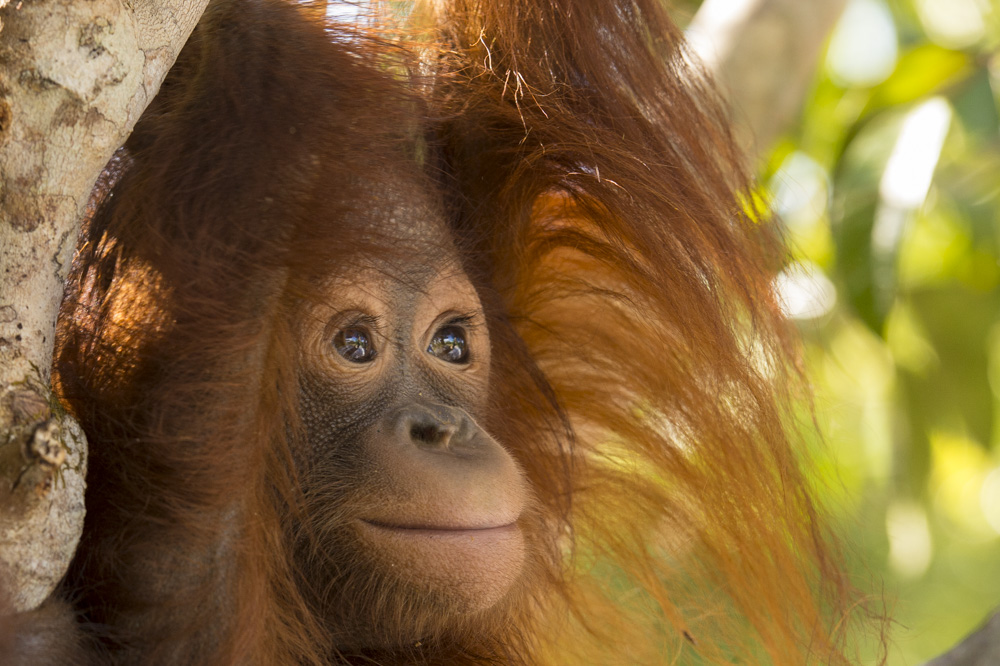
We also care for ten orphaned infant orangutans at our release camps - plus many dozens of reintroduced and translocated adults that are thriving in the wild under our protection. We owe it to these orangutans to keep their forest home safe.
Please DONATE SECURELY THROUGH OUR WEBSITE, by calling 020 7724 2912, or by sending a cheque payable to ‘Orangutan Foundation’ to Orangutan Foundation, 7 Kent Terrace, London, NW1 4RP. If you are unable to donate immediately but want to make funding pledge, whether through fundraising or a delayed donation, please contact us to discuss options – we will work with you however we can.
Sponsor the protection of Lamandau Wildlife Reserve
- £15 protects 10 acres of forest for one year
- £37.50 protects 25 acres of forest for one year
- £75 protects 50 acres of forest for one year
- £150 protects 100 acres of forest for one year
We must act today to secure the future for orangutans, forests and people.
With sincere thanks,
Ashley Leiman OBE
Founder & Director/Trustee
![]()
Volunteer in Borneo with Orangutan Foundation in 2018
We are looking for a few more adventurous individuals to join our volunteer team in Borneo. This year's project is the renovation of a forest guard post in the Lamandau Wildlife Reserve. Volunteers will be working and living on the site, which is a beautiful remote location in the middle of the forest. You will wake up and go to sleep to the sounds of the forest.
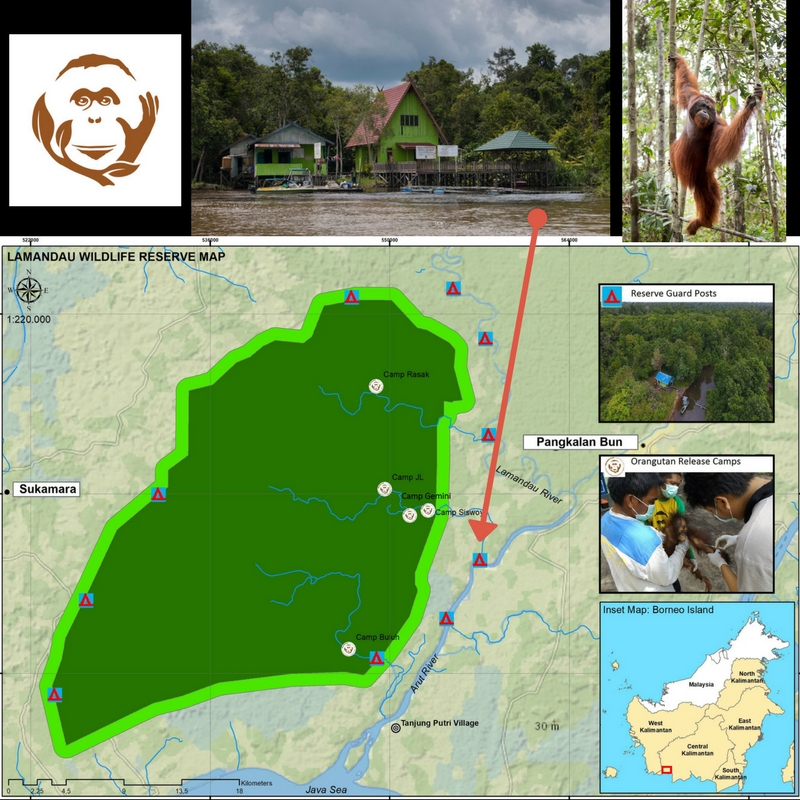
Last November, The Guardian ran an article featuring a first-hand account from one of our volunteer. It is well worth a read if you are interested in volunteering. https://www.theguardian.com/travel/2017/nov/01/borneo-voluntourism-holiday-orangutan-foundation
Orangutan Foundation does not allow any of its volunteers to have direct contact with orangutans and this is for the benefit of the apes. Most people understand this and can see the bigger picture of what they are doing. Watch Orangutan Foundation’s Cathy Smith talking at Compass Ethical Travel Conference about ethical volunteering. https://www.youtube.com/watch?time_continue=213&v=3KM4ZBLvo38
If you want to spend a unique 3 weeks doing something worthwhile for orangutan conservation and see orangutans in the wild, then why not make this the year to join us? To find out more please click here or contact us.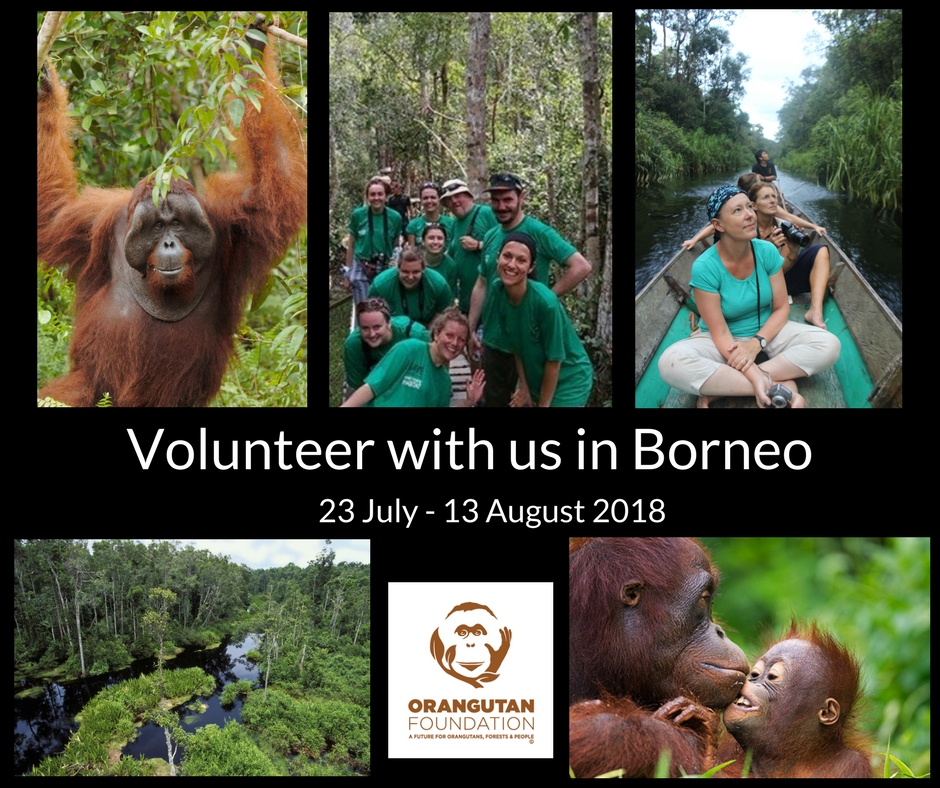
Forest fire spreads to orangutan habitat
Fires, deliberately lit next to an oil-palm plantation, have spread to the Lamandau Wildlife Reserve, home to over 500 critically endangered orangutans. This is the second fire this year. Please donate to help us.
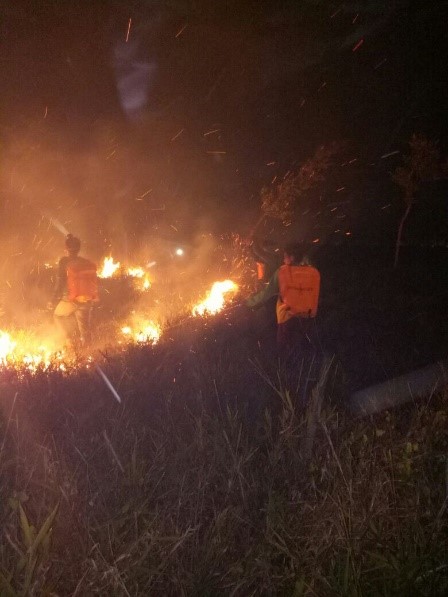
The Orangutan Foundation's guard post staff spent yesterday evening and all last night fighting the fires. We can't thank them enough for their bravery and efforts to protect the Wildlife Reserve. The fire, as the map below shows, was on the other side from our Orangutan Release Camps and so our young orphaned orangutans and Aan, the blind orangutan, are safe. However, other wild orangutans and species will have been harmed by these fires.
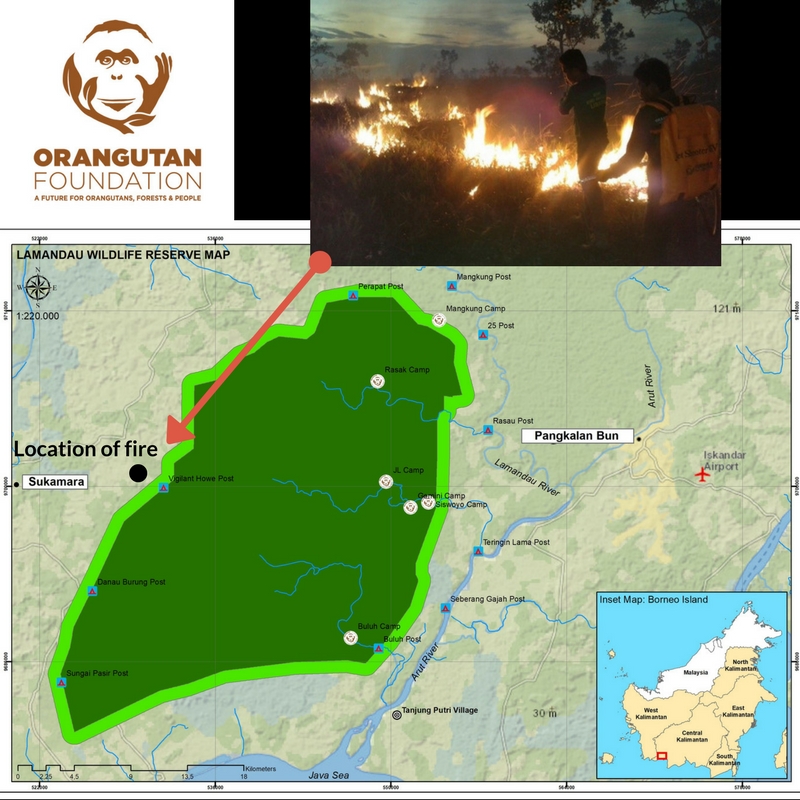
We are alarmed that fires have been lit in the first place but are spreading so easily, especially at this time of the year. It is meant to be the wet season but the scrub land, just bordering the reserve, and the forest, inside the reserve, is unusually dry due to lack of rain. In 2015, an El Nino year, over 11,000 hectares of the reserve burnt. This cannot happen again.
At around 18.00 hrs yesterday our guard post staff at Post Vigilant Howe detected fires about 3 km outside the boundary of the Lamandau Wildlife Reserve. The fires are thought to have started near to PT Sampurna oil-palm plantation.
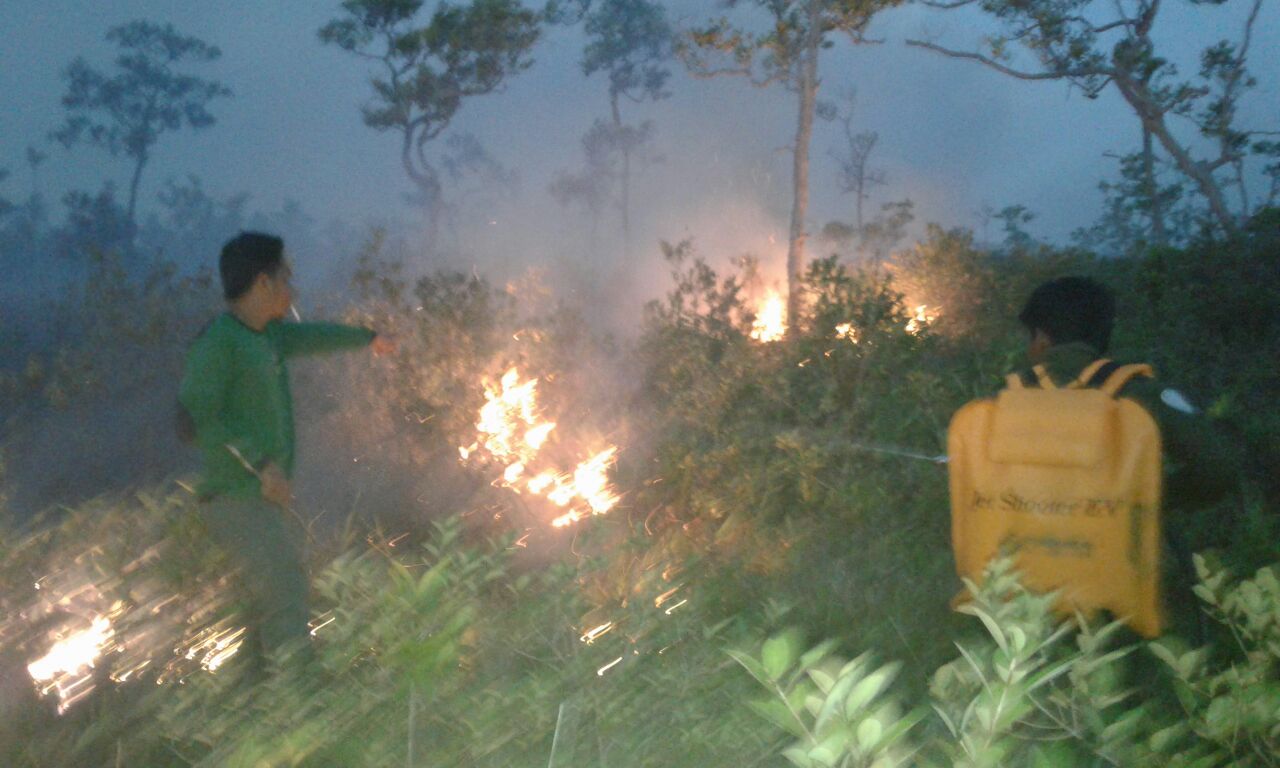
Our staff from Guard Post Danau Burung and Government Resort staff BKSDA SKW II from Guard Post Sungai Pasir tried to extinguish the fires for 3 hours using water jet pack shooters. At 20.00hrs they realised the fire was growing due to the wind and ready fuel of dried shrubs and grass. They informed the Head of BKSDA Resort SKW II, Mr. Sugih Trianto and requested extra help. Our staff from Guard Post Perapat and even our Forest Restoration Manager, Anto, went to help tackle the fires.
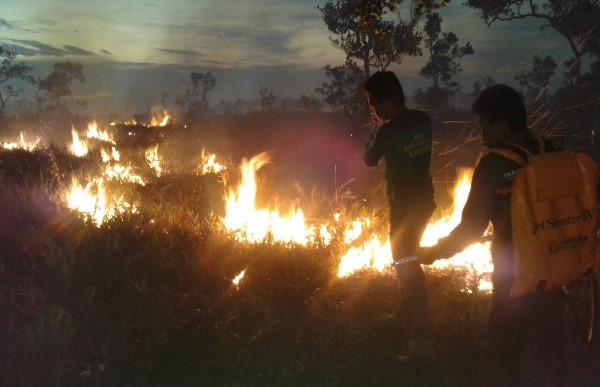
At around 03.00hrs the fire was eventually extinguished by an exhausted team, made up of Orangutan Foundation and staff of BKSDA SKW II.
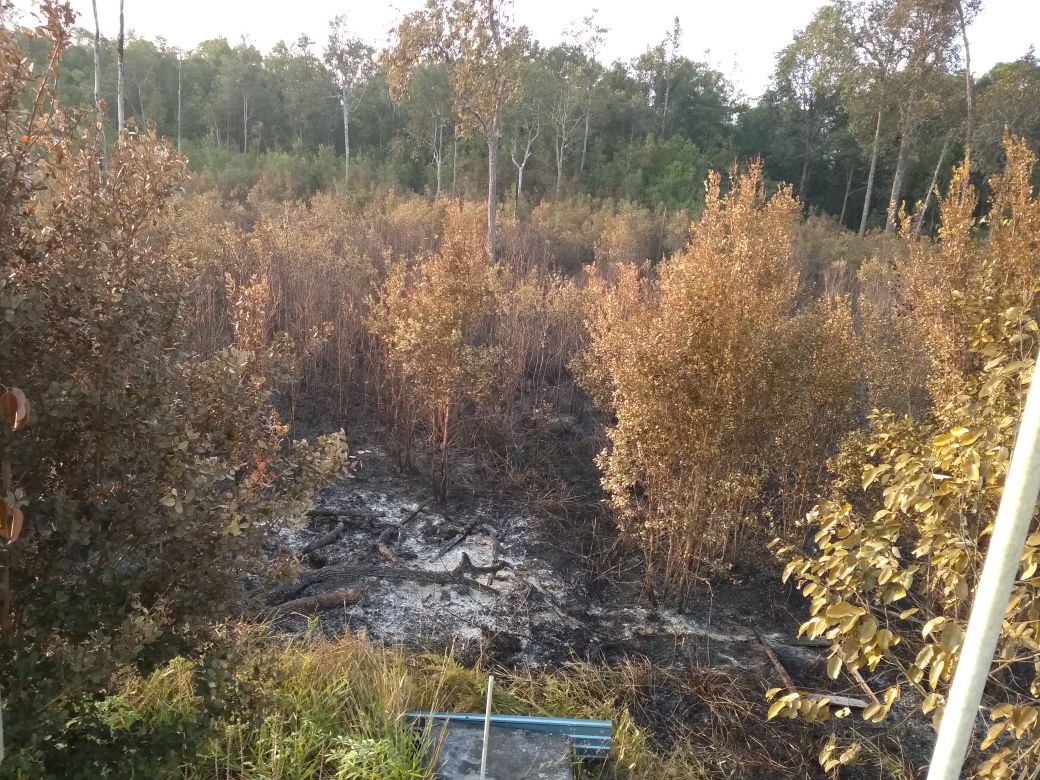
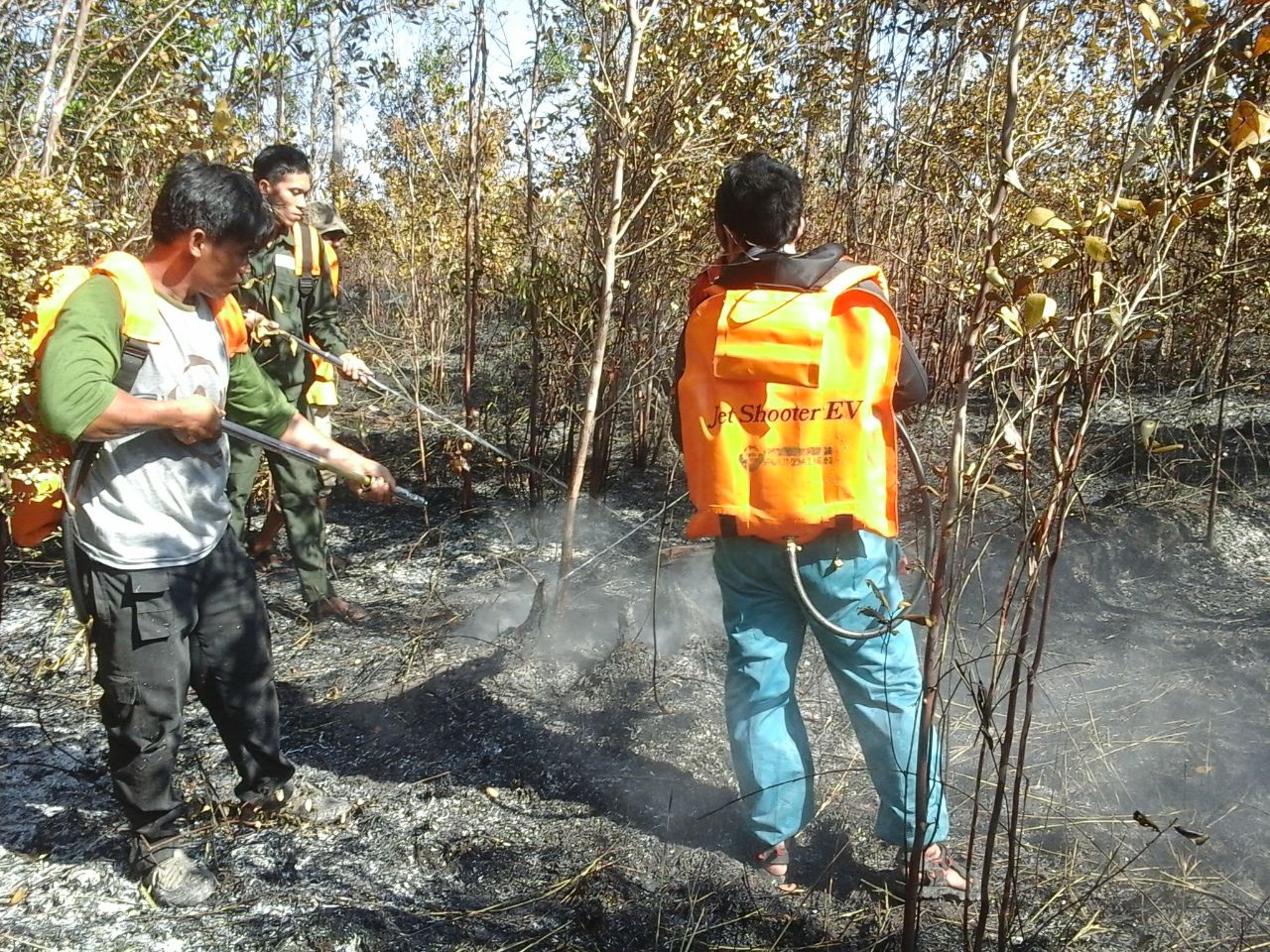
At 10.00 hrs today our team returned to the location of the fire and extinguished any smouldering vegetation. The fires were very close to our Guard Post Vigilant Howe. Using GPS, the total area of the fire was 61 hectares, which is the equivalent to the area of 150 football pitches.
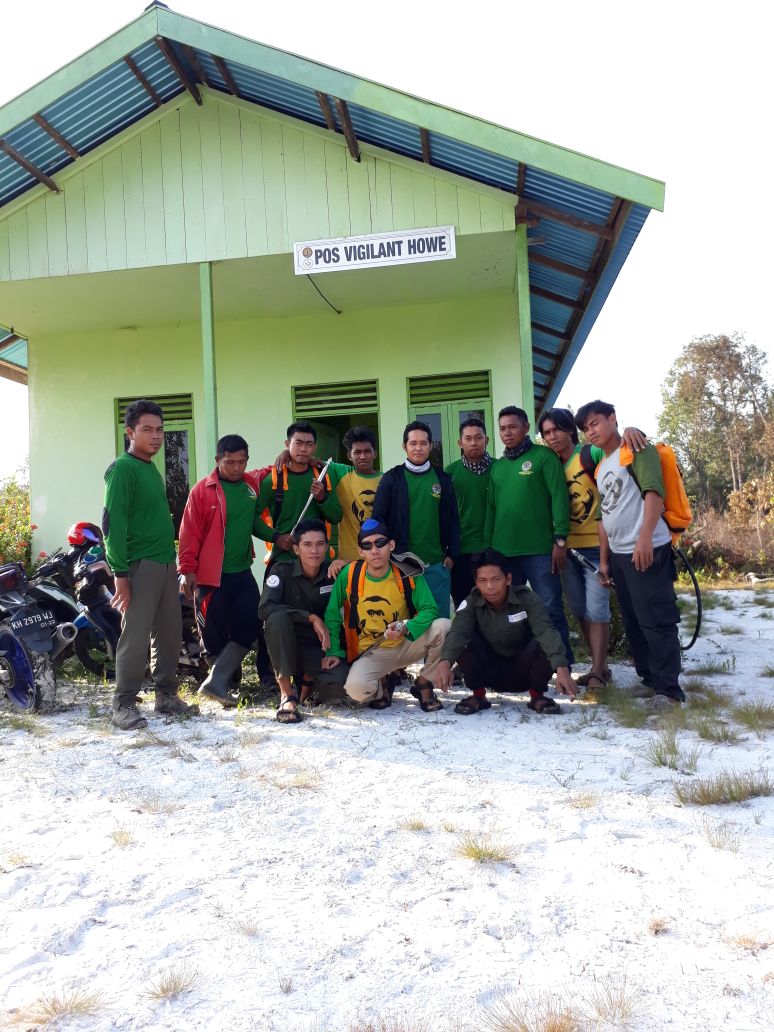
At a time when orangutan numbers are falling dramatically we need to ensure their habitat is safe. This is the second fire this year alone and we have also detected and stopped 2 cases of illegal logging. Help us to protect these forests and orangutans. If you can, please consider making a regular donation. Donate today
Thank you,
Orangutan Foundation
Stop habitat loss, stop orangutans being killed
In the last month we have heard disturbing reports about the cruel and brutal killing of two critically endangered Bornean orangutans. Sadly, our staff care for the victims, of these sort of actions, every day. We're still caring for Aan, shot 104 times and left permanently blind. Little Bumi, rescued last year, 8 pellets removed, his mother must have been shot and killed.
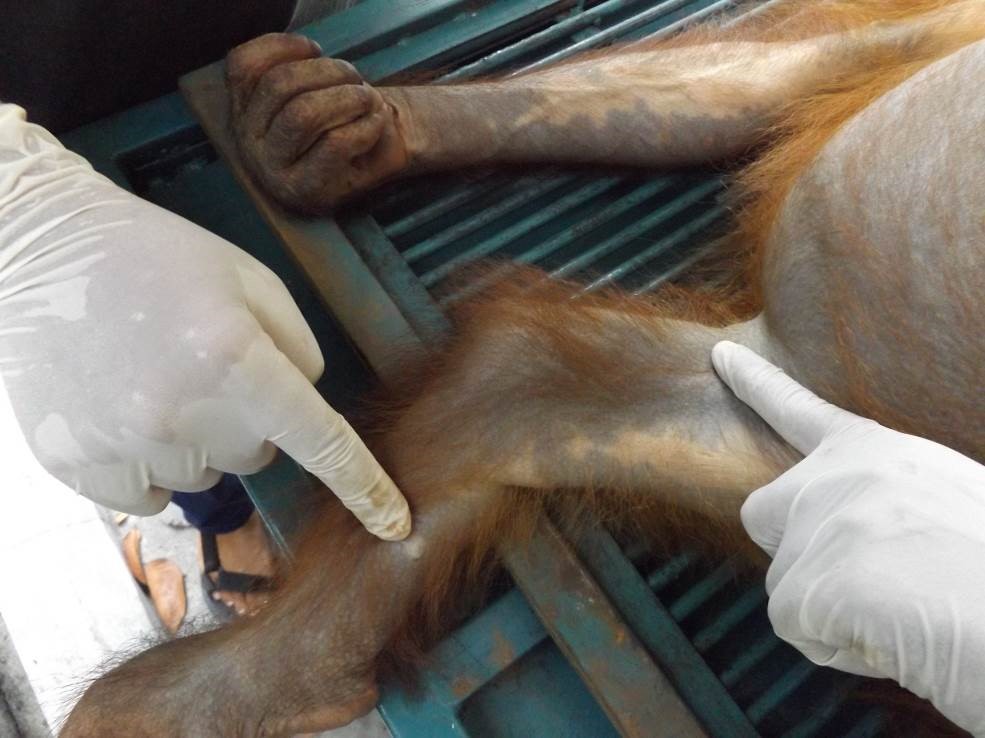
We ask ourselves, how could someone harm these gentle, intelligent and peaceful beings?

The killing of an orangutan is a visible threat, rightly generating shock and outrage. The invisible threat that forces orangutans into increasing contact with humans, onto oil-palm plantations or village farms, is habitat loss. We use the term invisible because habitat loss does not elicit the same level of response as an orangutan killing.
In the last month our guard post staff have tackled illegally lit fires and prevented them spreading, but still 30 hectares burnt. This week, they detected the second case this year of illegal logging, right on the boundary of the Lamandau Wildlife Reserve. This is meant to be strictly protected forest, it has a population of over 500 orangutans. We need to keep it protected and the orangutans safe.
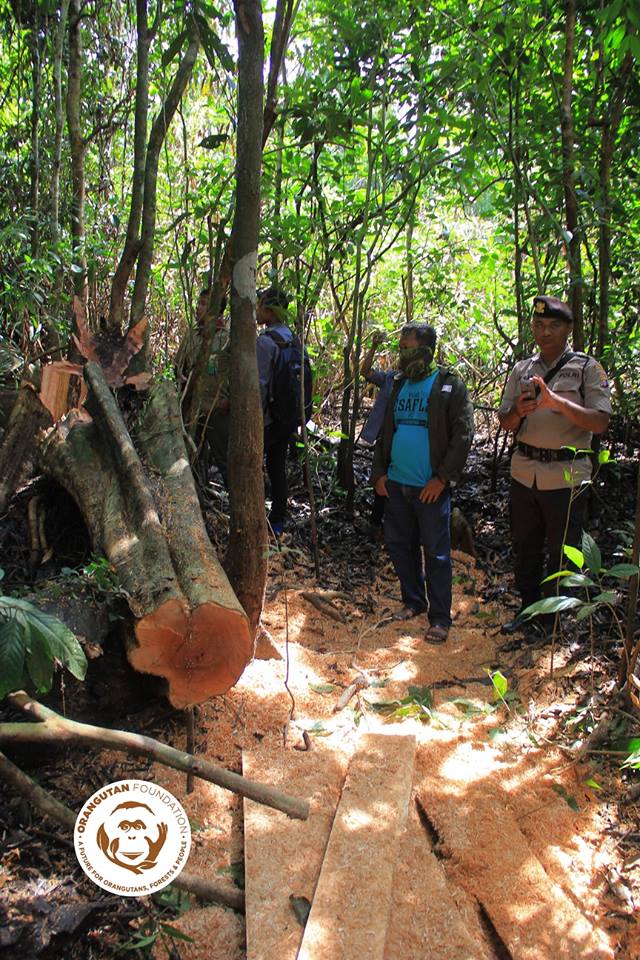
Why does the image of a fallen tree not also generate the same outrage? When forests are cleared, orangutans and hundreds of other species are harmed or even killed. Some survive, if they can move to another area of forest. This increases competition for resources and forces them into closer contact with humans. It is because we can’t see the immediate impact on orangutans and so our response is different.
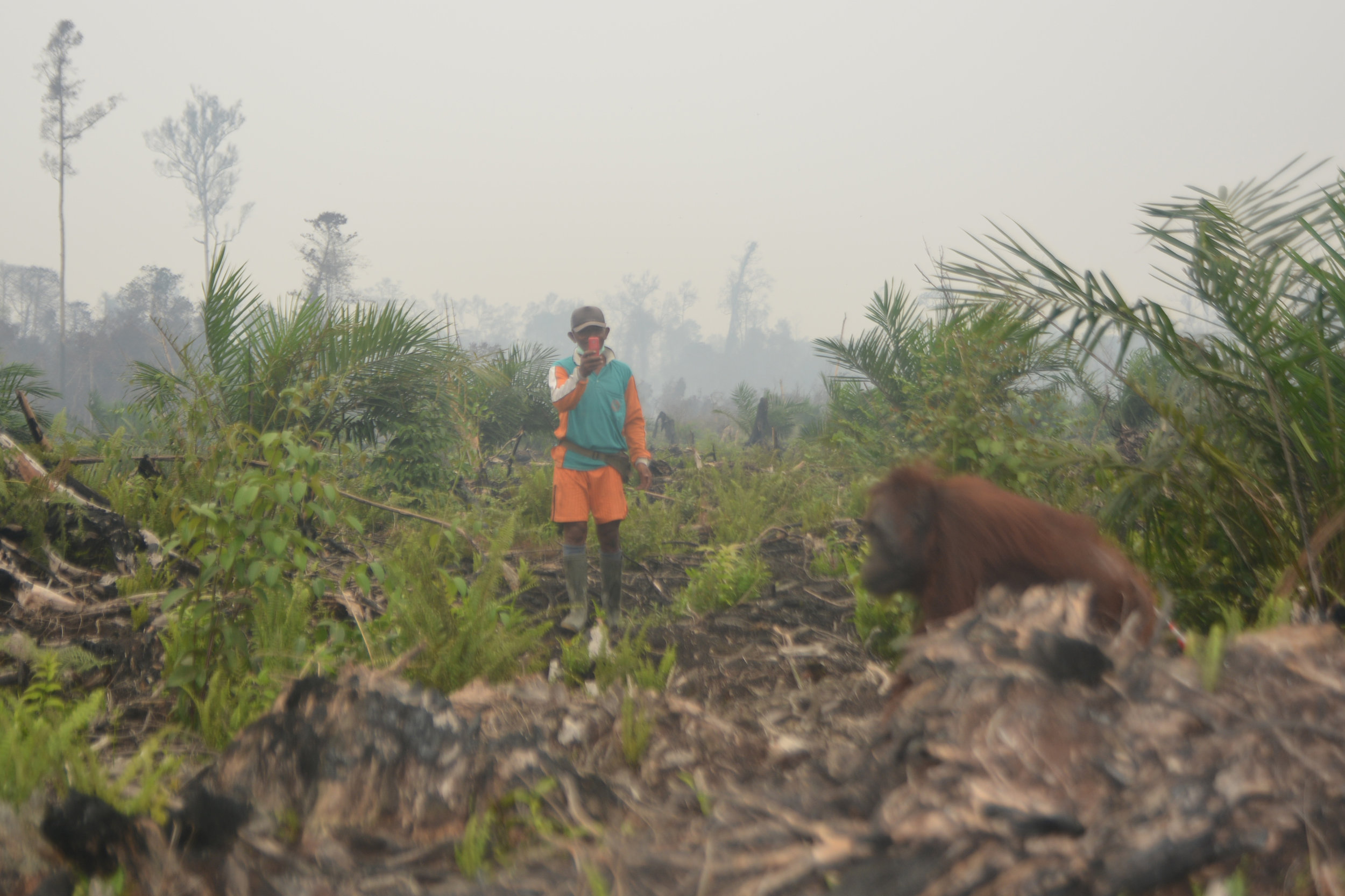
We need your help now, more than ever. Our guard post patrol staff require ongoing support to prevent illegal activities and further loss of orangutan habitat. The Lamandau Wildlife Reserve is huge, 158,144 acres of tropical forest (one acre is the approximate size of one football pitch). Our staff do a fabulous job patrolling such a large area but need to be supported.
Please help us to keep these vital forests standing and their precious inhabitants in wild. Please donate today.
If you can, please consider becoming a Guardian of Lamandau Wildlife Reserve, from £16.50 a month (the equivalent of 55p a day) you can make a significant difference. Thank you.
We thank the West Kotawaringin Police, KPHP Kotawaringin Barat, and BKSDA Kalteng for their joint patrols.
An Orangutan Foundation snapshot - 2017
Here is a snapshot of the Orangutan Foundation’s year in the field, thanks to our dedicated Indonesian staff. Most importantly, thank you for your ongoing support. We truly could not do, what we do, without you. January: Miners evicted from the Lamandau Wildlife Reserve and mining equipment confiscated.
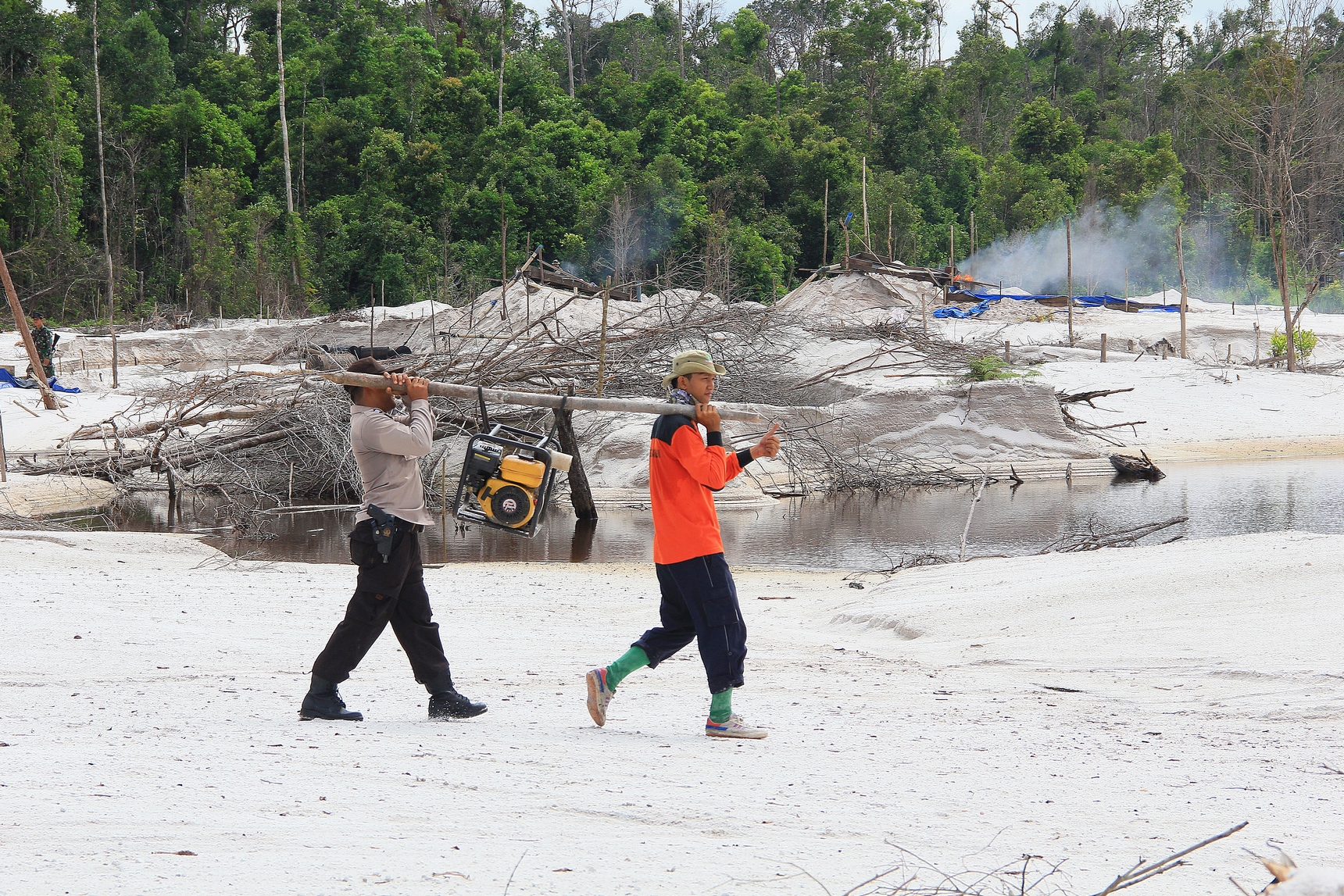
February: Attempts to restore sight to blind orangutan Aan sadly fail but her story galvanises support for her cause. We continue to care for Aan to ensure she has the best quality of life possible.
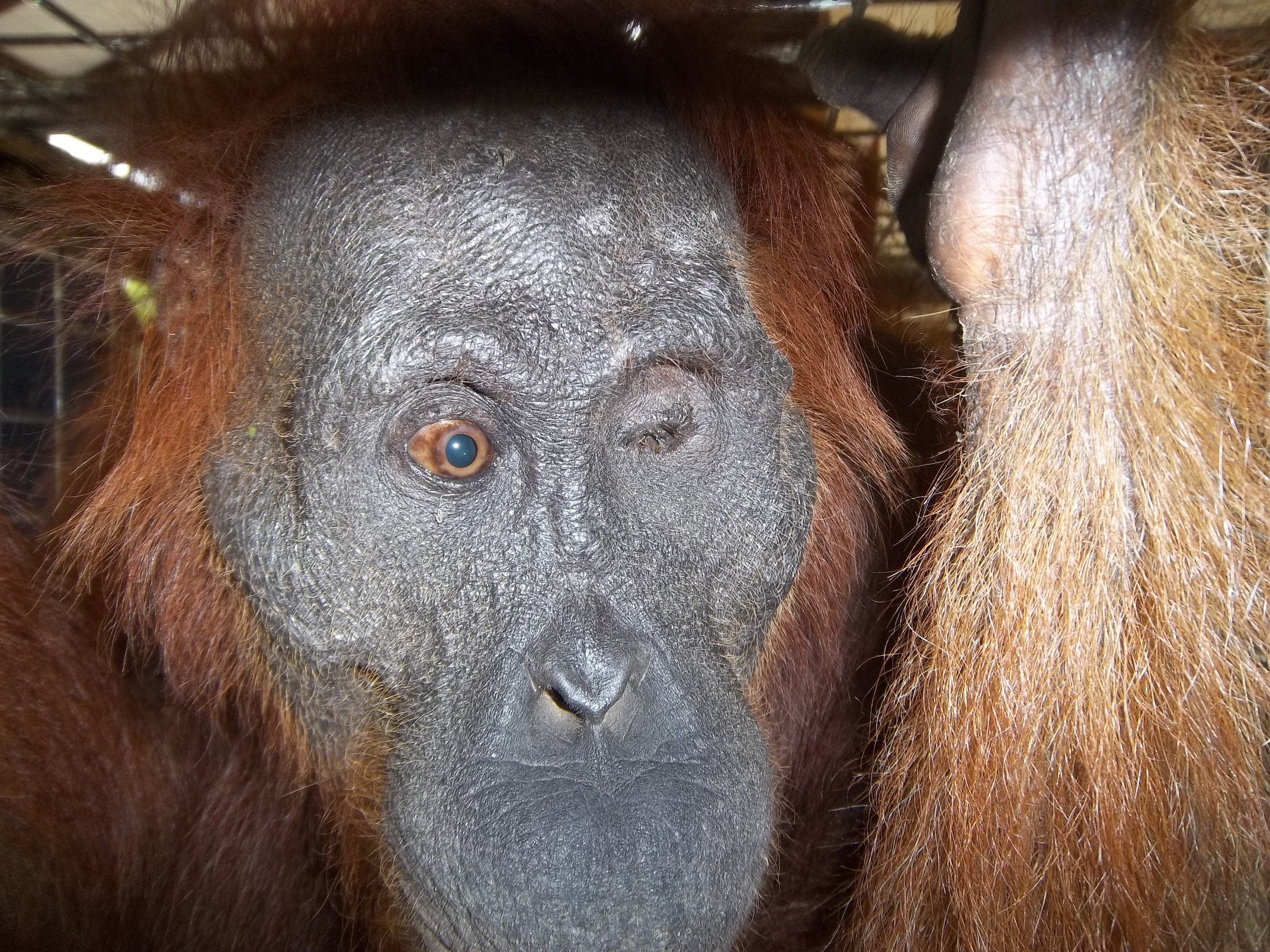
March: Infant orphans, Mona (top) and Nyunyu (below), are rescued and enter our Soft Release Programme, bringing it to 10 young orangutans being cared for.
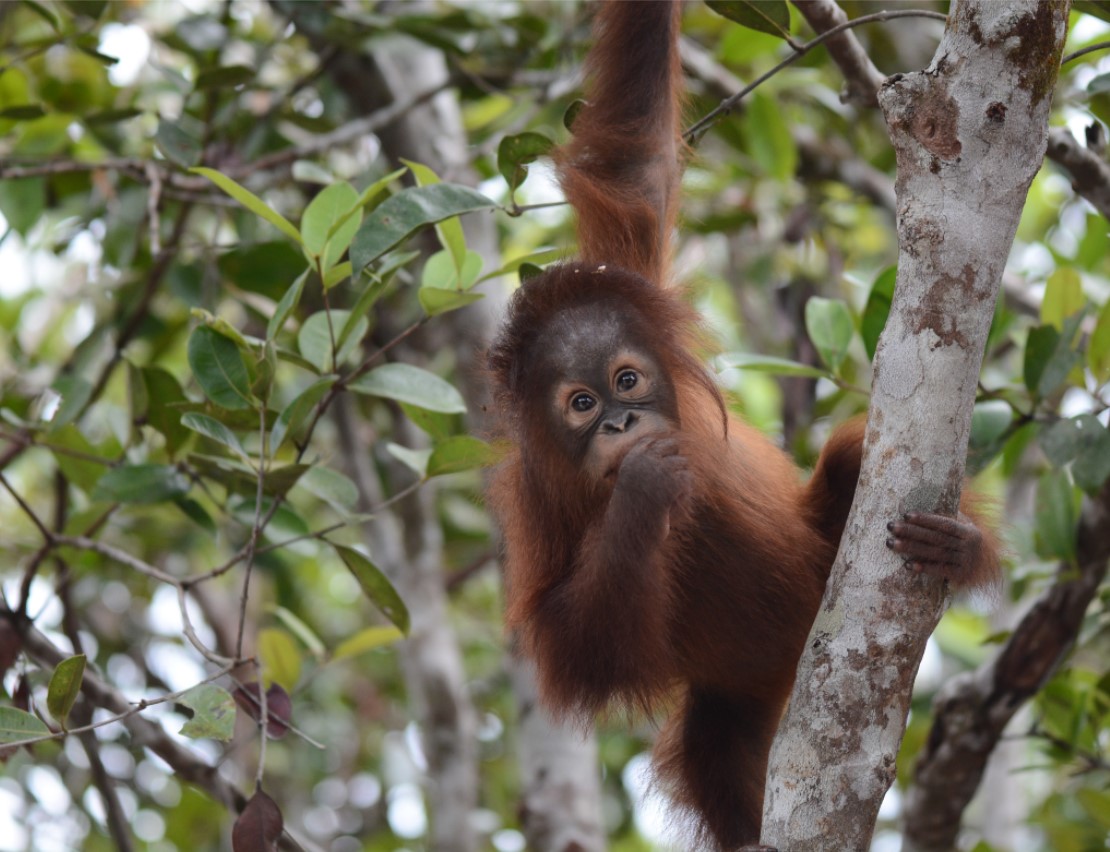
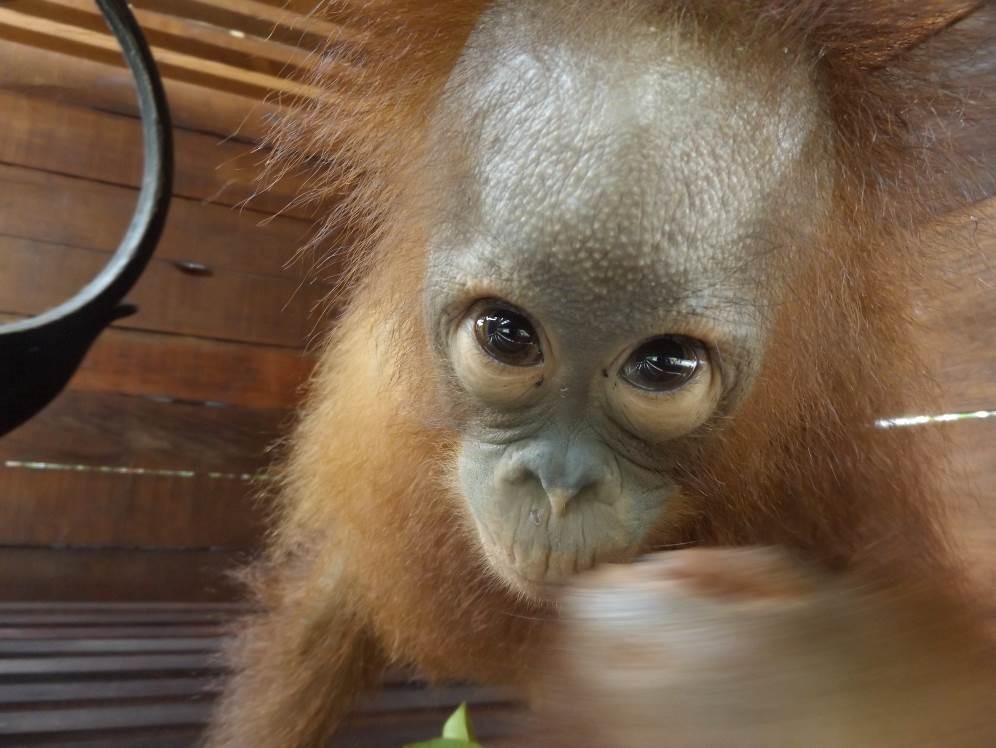
April: Orangutan Foundation, active on Earth Day, involving young Indonesian’s in cleaning up rubbish in their local environment.
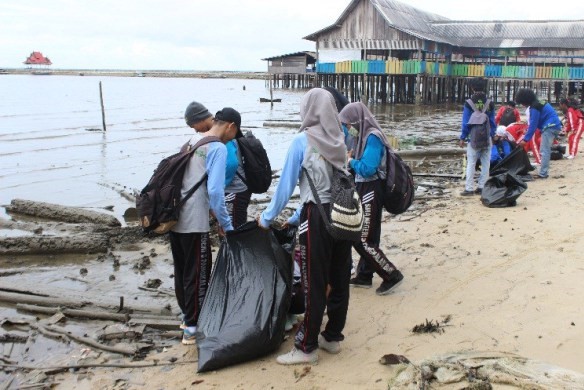
May: Publication of our new photo book promotes the wonders of the orangutan’s world and raises vital funds for forest restoration.
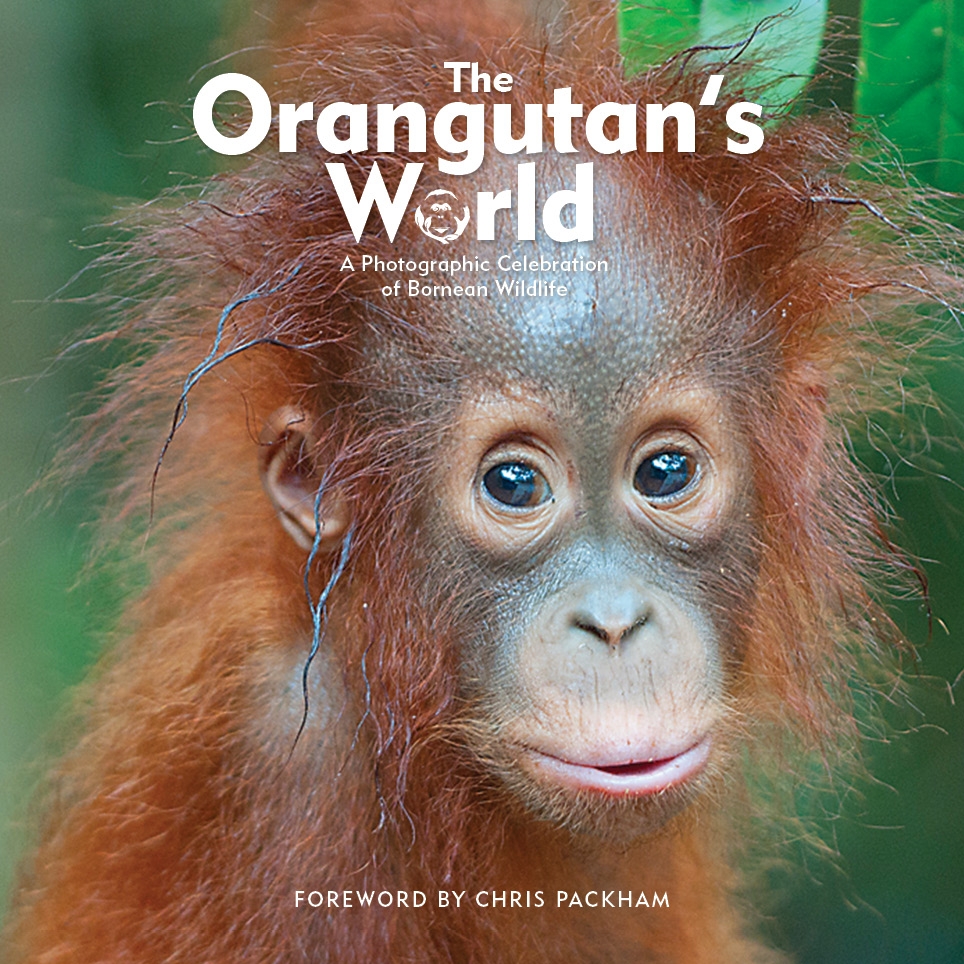
June: A new orangutan birth in Lamandau Wildlife Reserve. Venty shows off her new baby, Volvo.
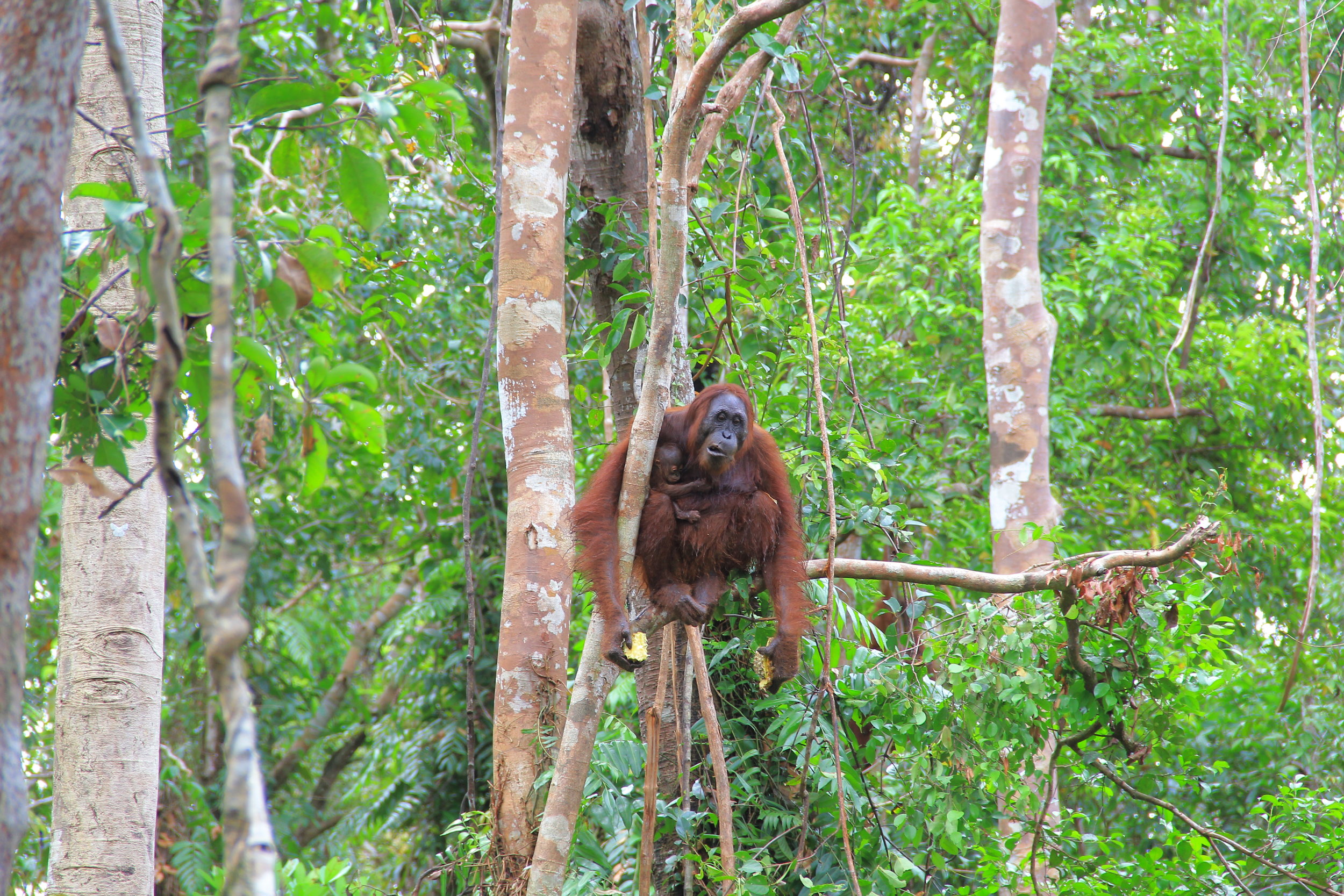
July: Another birth! Dedek gives birth to a healthy baby, named Dublin. Orangutans Jessica and Ketty, are released back to the wild!
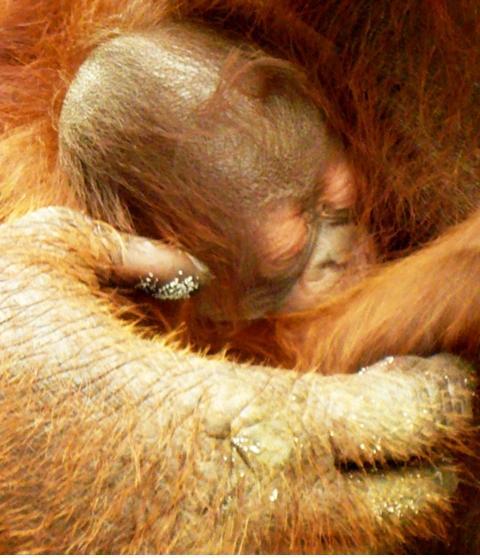
August: Orangutan Foundation staff help tackle fires and stop them spreading to the Lamandau Wildlife Reserve.
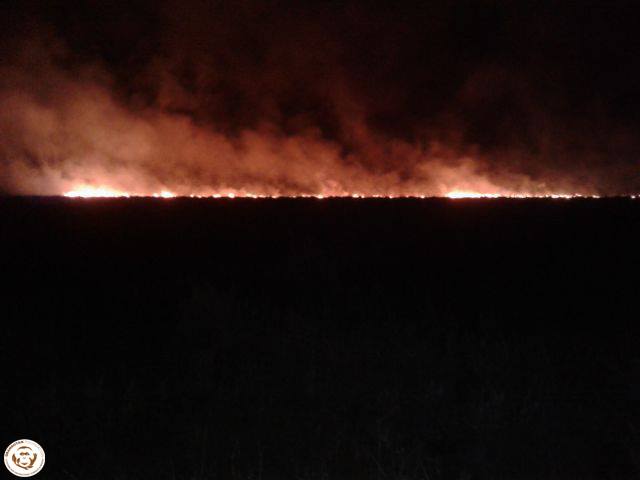
September: Orangutan Foundation Patrols in Tanjung Puting National Park remove and destroy illegal fishing traps, which also pose a threat to other wildlife species.
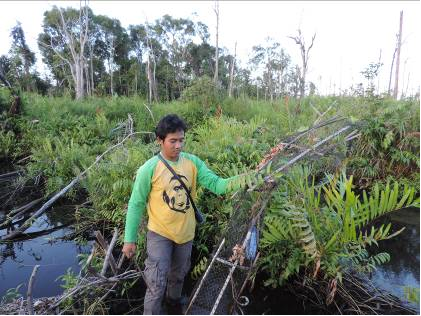
October: Bangkal, an ex-captive rehabilitated orangutan, reminds all who is King of Lamandau!
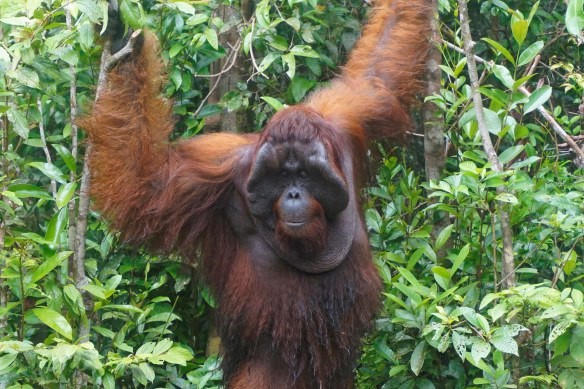
November: 22,000 tree saplings planted out in the Lamandau Wildlife Reserve in 2017
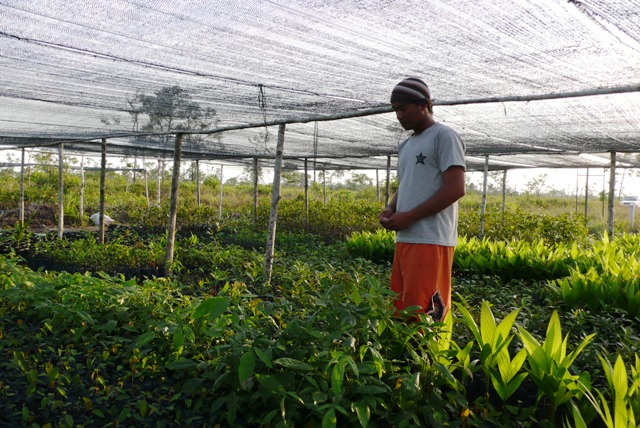
December: A wild female orangutan is rescued from a beach resort and translocated to the safety of the Lamandau Wildlife Reserve.
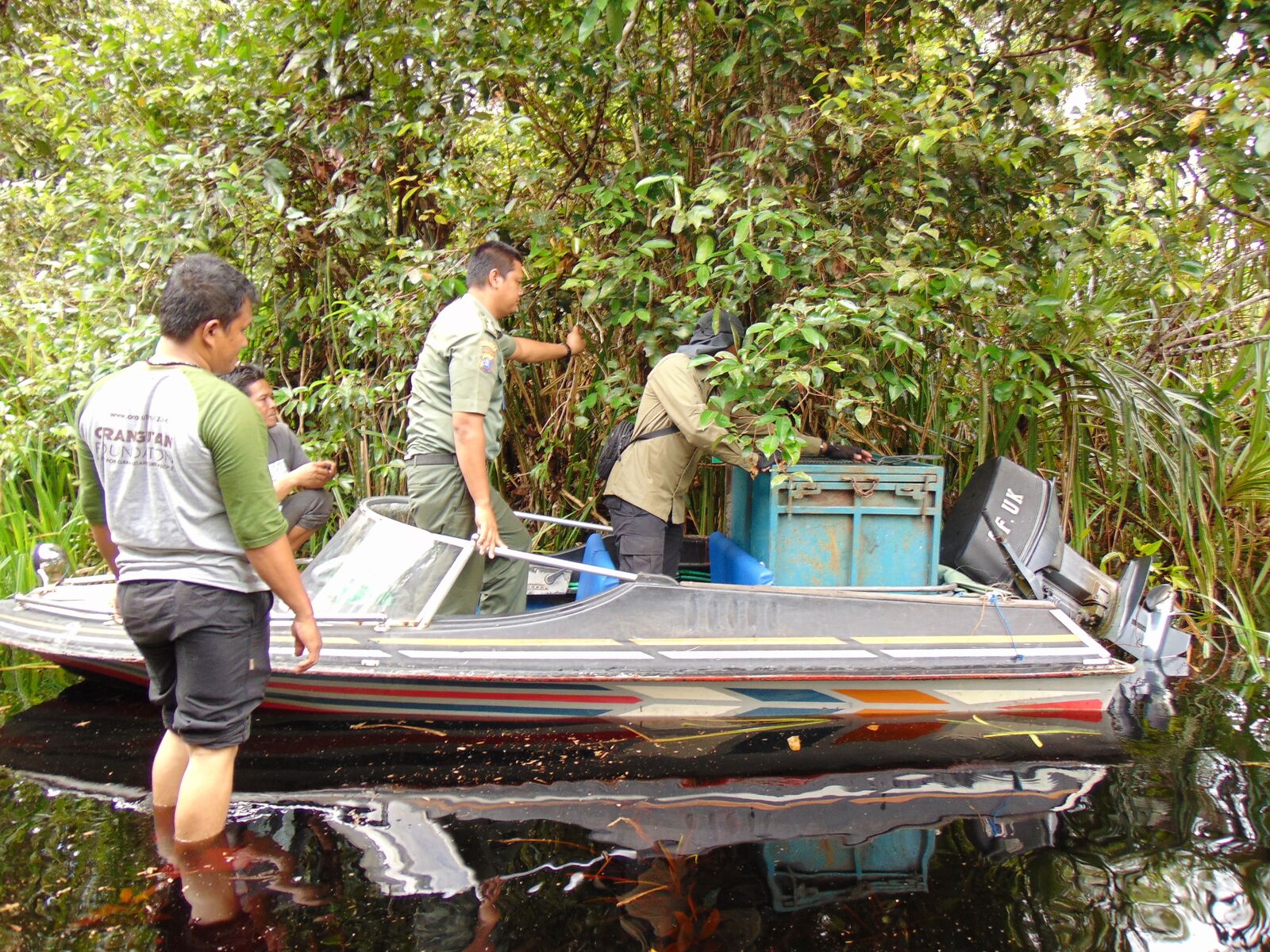
And to finish off our year here's Adib, the latest orphan orangutan to join us in November, making his first climb at Camp JL, in the Lamandau Wildlife Reserve.
DONATE to support our work
"All my days in the field are special, but on occasion something really exciting happens - a fight between two male orangutans and we were able to film it." - Ashley Leiman OBE
No sooner had our speedboat arrived at Camp Buluh when the staff came running and excitedly told us to hurry up. I knew before I reached the end of the jetty by the noise of breaking branches that something was going on in the forest ahead.
It didn’t take me long to see one huge male being pursued by another, both cheek padded. The assistants told me that they were Yoko, who was often seen around Camp Buluh, and Darwin, who hadn’t been seen for a number of years.
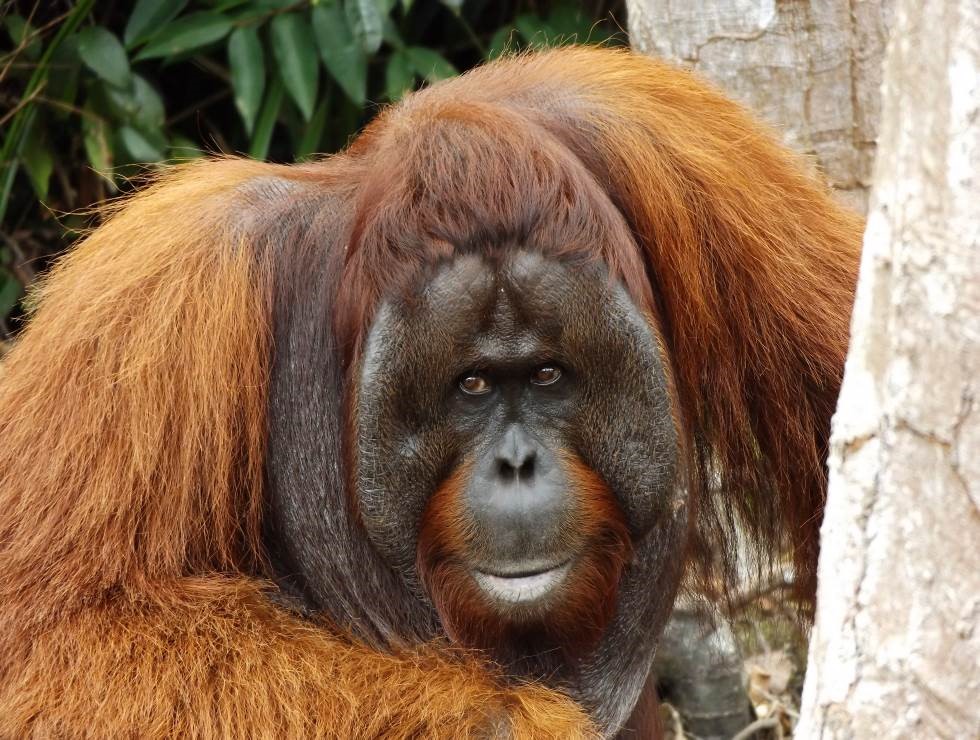
The orangutans were face-to-face in open combat. They would grapple one another, no doubt inflicting some injuries. This would last for a number of minutes until one would go further into the forest and there would be a lull in the confrontation.
There were times when both came down to the ground, one aggressively pursuing the other, before going back up into the trees. What was interesting was that during the conflict they would occasionally stop to rest, so obviously this activity takes a lot of energy.
Long calls and branch cracking perforated the performance. This encounter went on for over two hours before Darwin, realising Yoko had the upper hand, made his way further into the forest and was not followed. That’s what I love being in the field, it’s never boring, it’s not every day one sees such excitement.
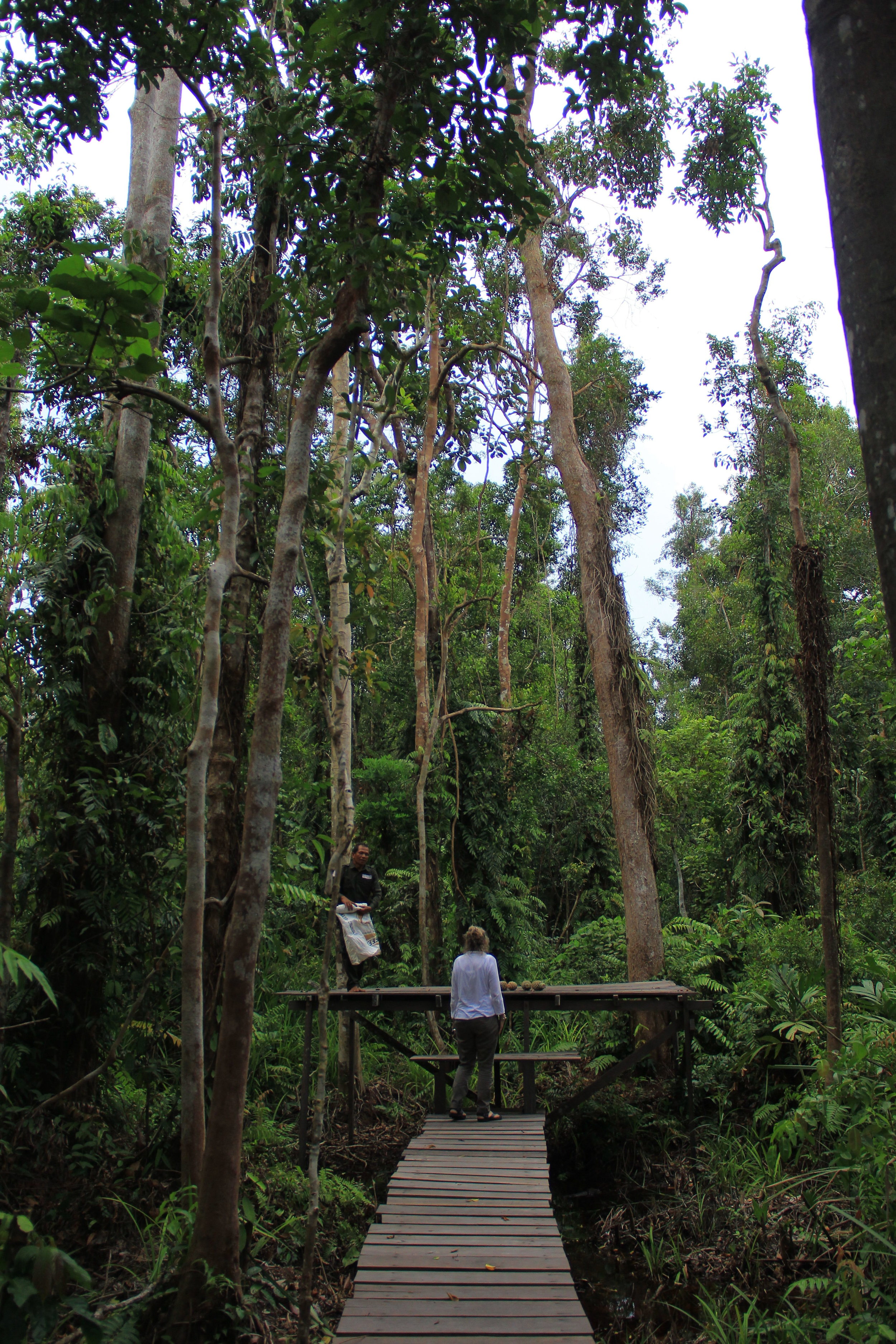

Become a Guardian of Lamandau today and help us protect the home of Yoko, Darwin and over 500 other critically endangered orangutans. Click here to find out more.
Thank you.
Ashley Leiman OBE, Director
An interview with Jakir - Patrol Manager, Orangutan Foundation
To finish off Orangutan Awareness Week, our final blog post is about Jakir, who oversees the protection of the Lamandau Wildlife Reserve and its precious inhabitants. He has been in this role for 10 years. Jakir is also a talented photographer and many of his images have been included in our new photobook, The Orangutan's World. Our committed Indonesian staff are the bedrock of all we do. Please donate to support our vital work, keeping forests standing and orangutans in the wild.
Jakir, Patrol Manager Orangutan Foundation
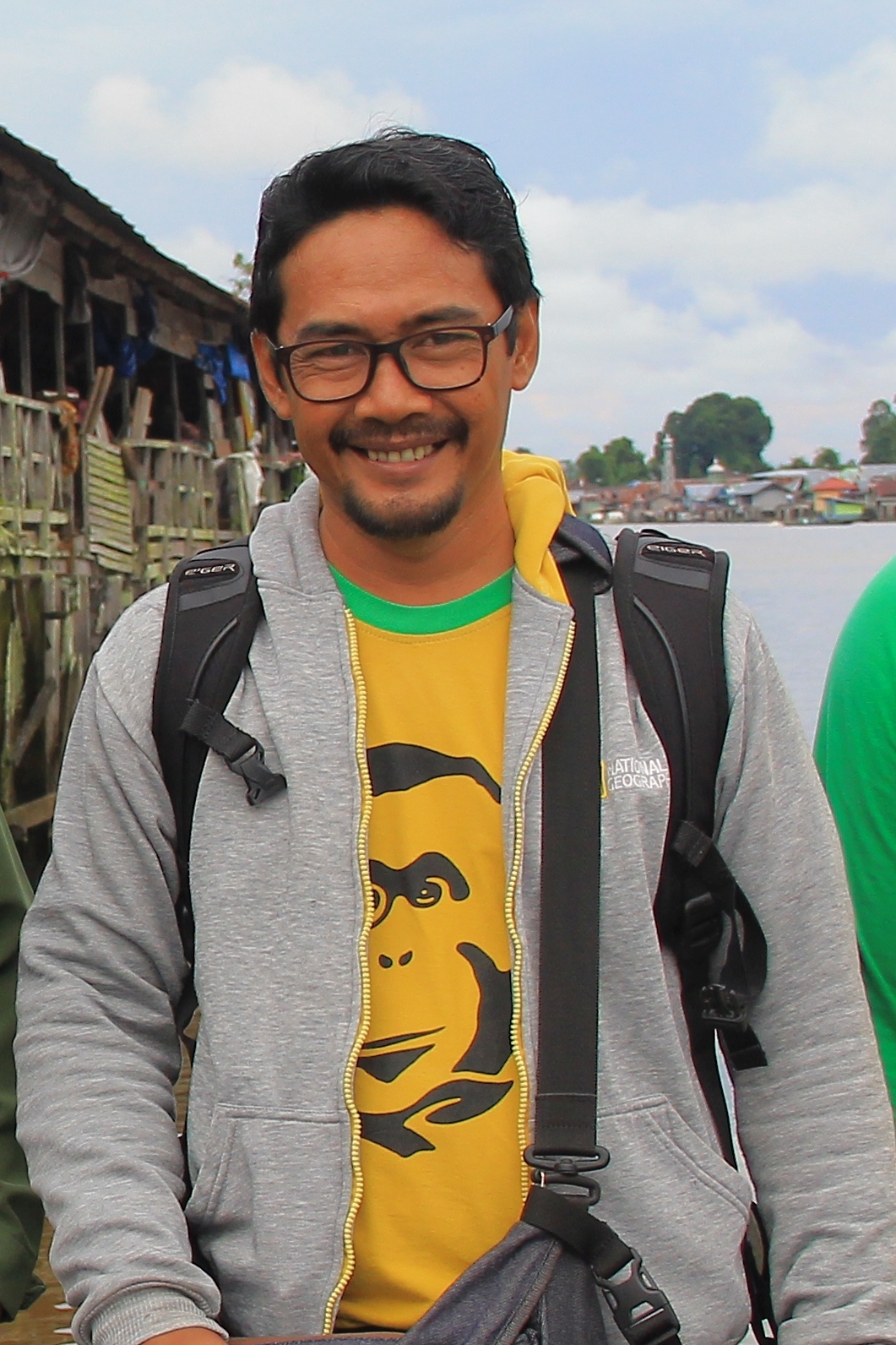
My role as Patrol Manager is to supervise the 12 staff who occupy our eight guard posts, ensuring that they are well maintained and operated, so that the wildlife reserves are protected from illegal activities, such as logging, mining, hunting and fishing.
It’s a very important role and I most of all I love the interaction with the local community in the field. Sometimes ignorance is the reason for illegal activities, and we tell people what we are doing so they also understand why we are protecting the forest.
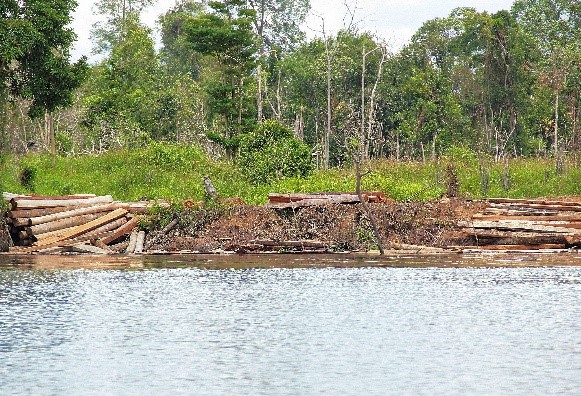
But the biggest challenge is facing people who deliberately do illegal activities. We have faced threats and bribes, but some people who were previously involved in illegal forestry now give us information on illegal activities they encounter.
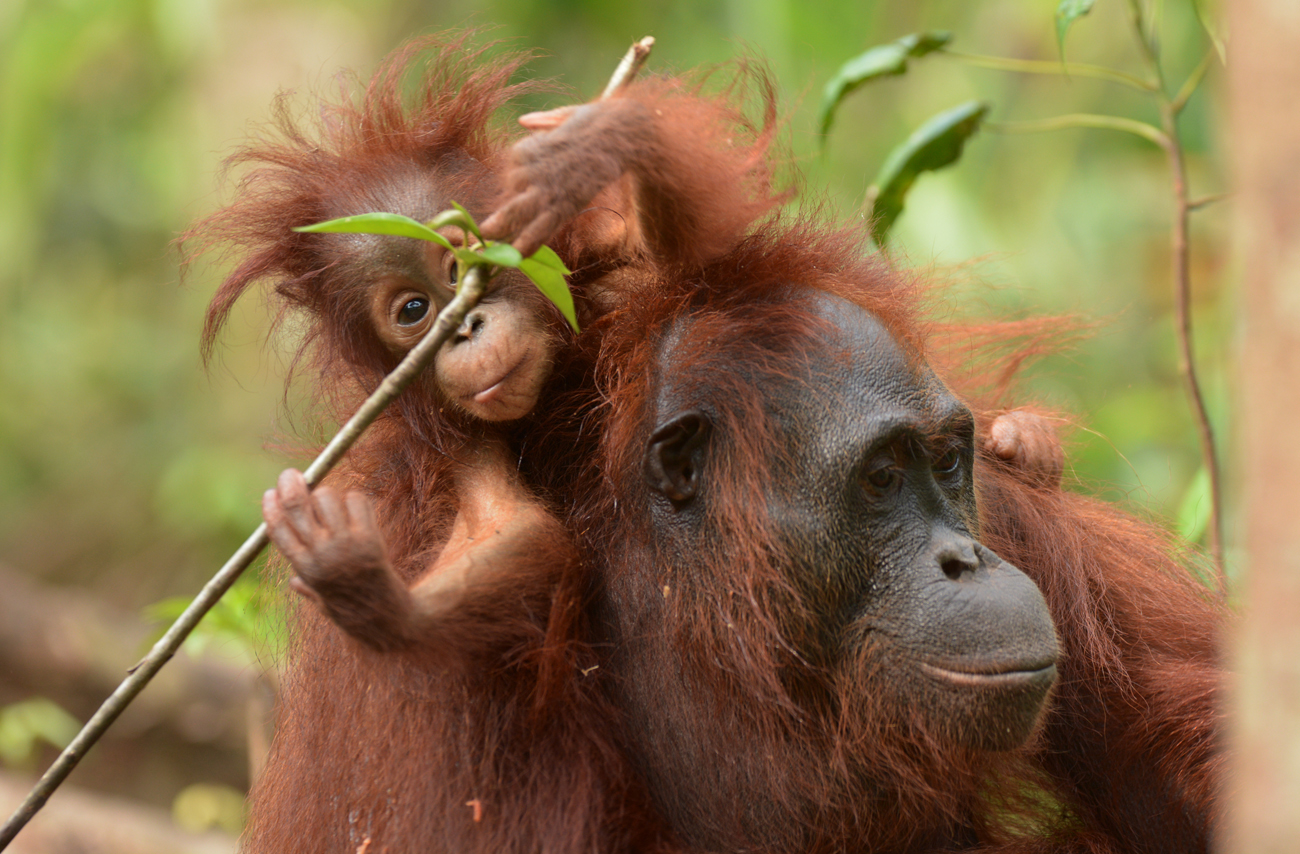
It’s very special to see some of the animals that we have saved roaming free in the forest in Lamandau.

When I first met Ashley, the Director of the Orangutan Foundation, I didn’t understand why she talked so much about protecting the forest and sacrificed so much of her own time for this. But a long time afterwards I saw some villages submerged by flooding and I realised why protecting the forest is so important.
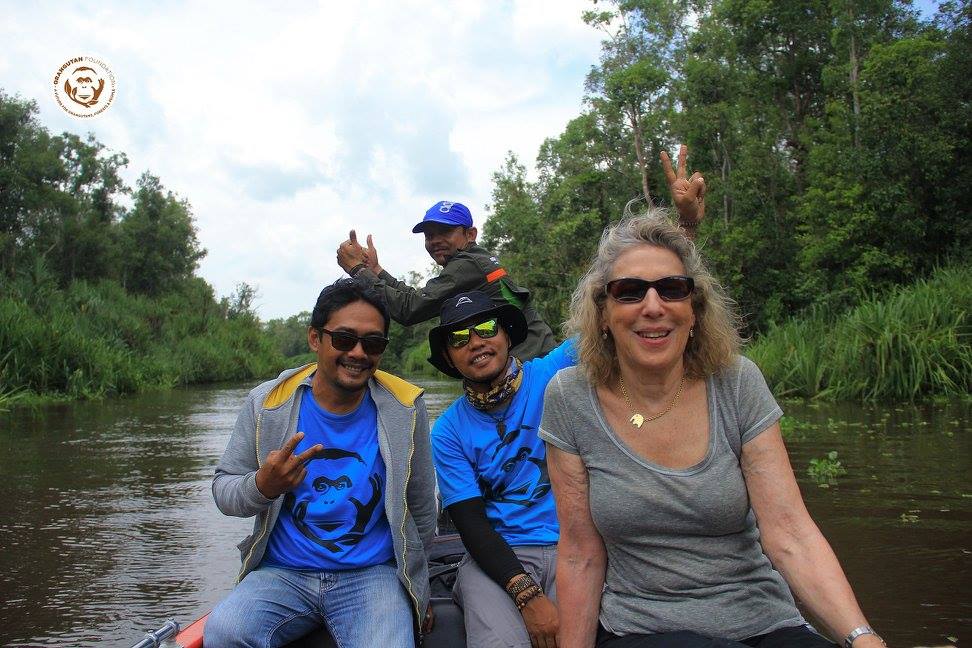
My hope is that the forest will always be alive and awake, so that my grandchildren can see and feel the coolness of this forest.
Written by Anna Levin, this interview was featured in our latest member's newsletter, Red Ape, Autumn 2017.
By donating £16.50 a month you can become a Guardian of the Lamandau Wildlife Reserve and support the protection of over 150,000 acres of tropical forest habitat. Click here to find out more.
Why Orangutan Foundation needs your support, more than ever.
If you are a member or supporter you will already know that our priority is protecting orangutan habitat. If we keep forests standing we can ensure orangutans stay in the wild (see video below of wild male). In the past few months our committed Indonesian staff, working on the front-line of conservation, have successfully:
- Detected and prevented illegal activities within two protected areas, home to thousands of Bornean orangutans and many other critically endangered or threatened species.

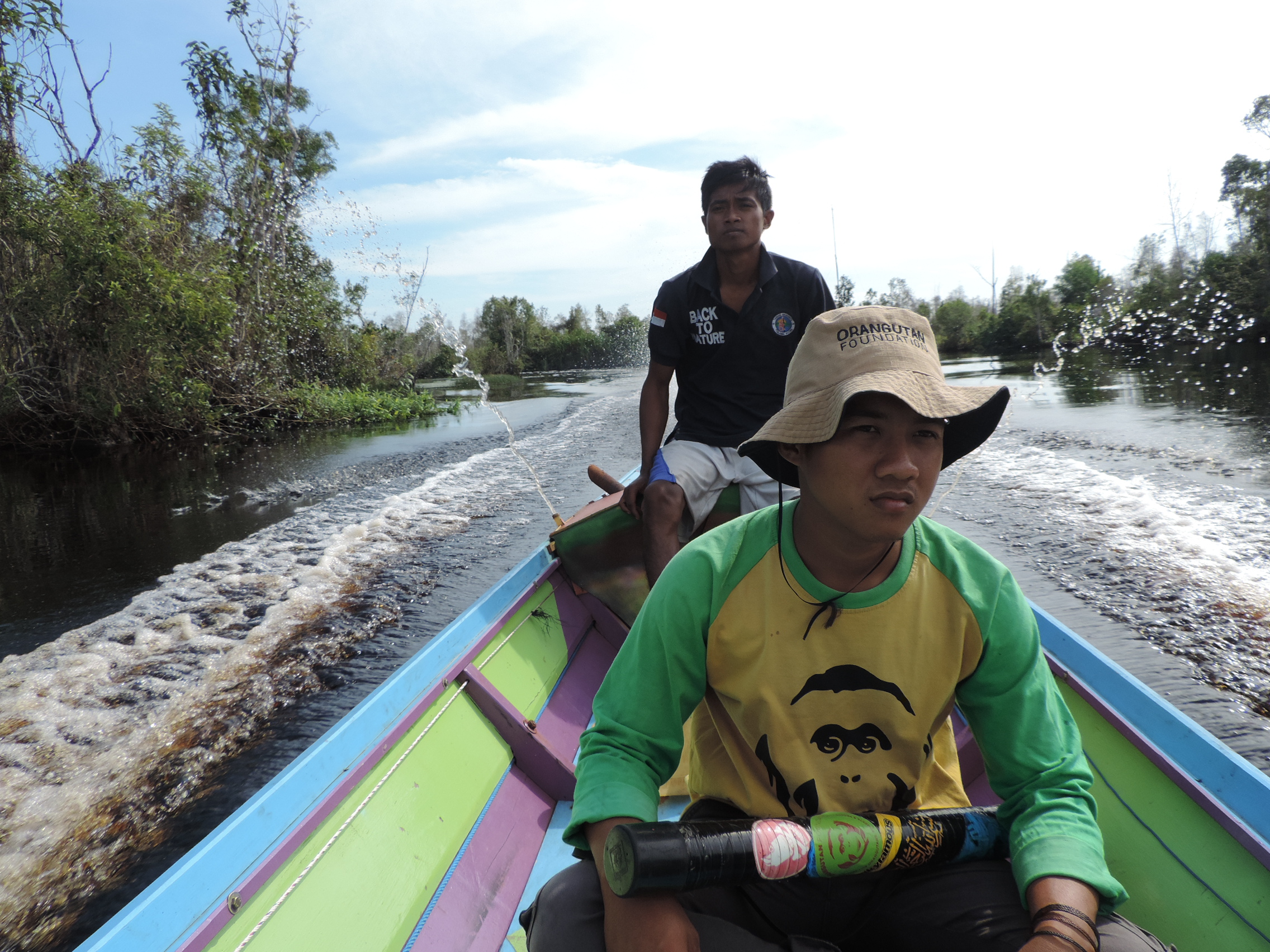

- Prevented the spread of fires to the Lamandau Wildllife Reserve, home to an estimated 500 Bornean orangutans.
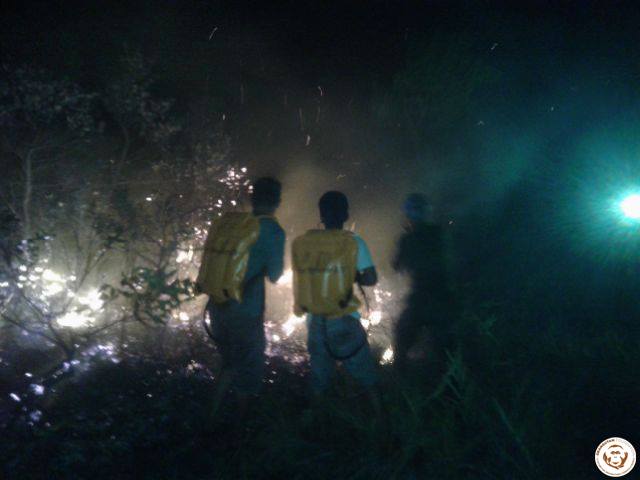
- Nurtured tens of thousands of tree saplings and planted in degraded forest areas of Tanjung Puting National Park and the Lamandau Wildlife Reserve.


- Trained our staff and community to prepare for and tackle fires
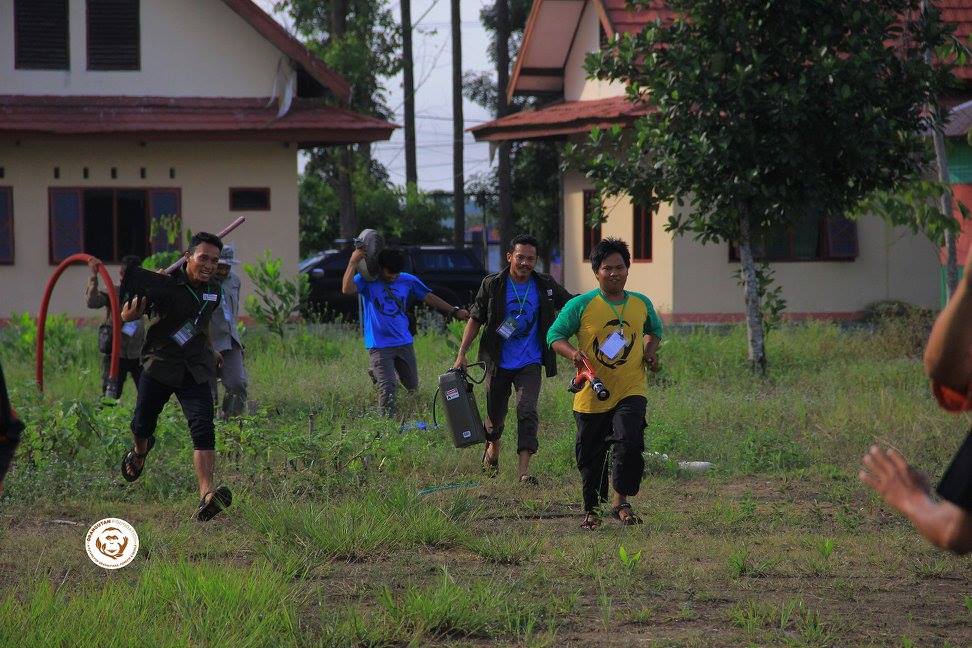
- Engaged with the Indonesian government and companies to implement best forest management in unprotected orangutan habitat.
We do all this so that wild orangutans, like the one below, stay wild.
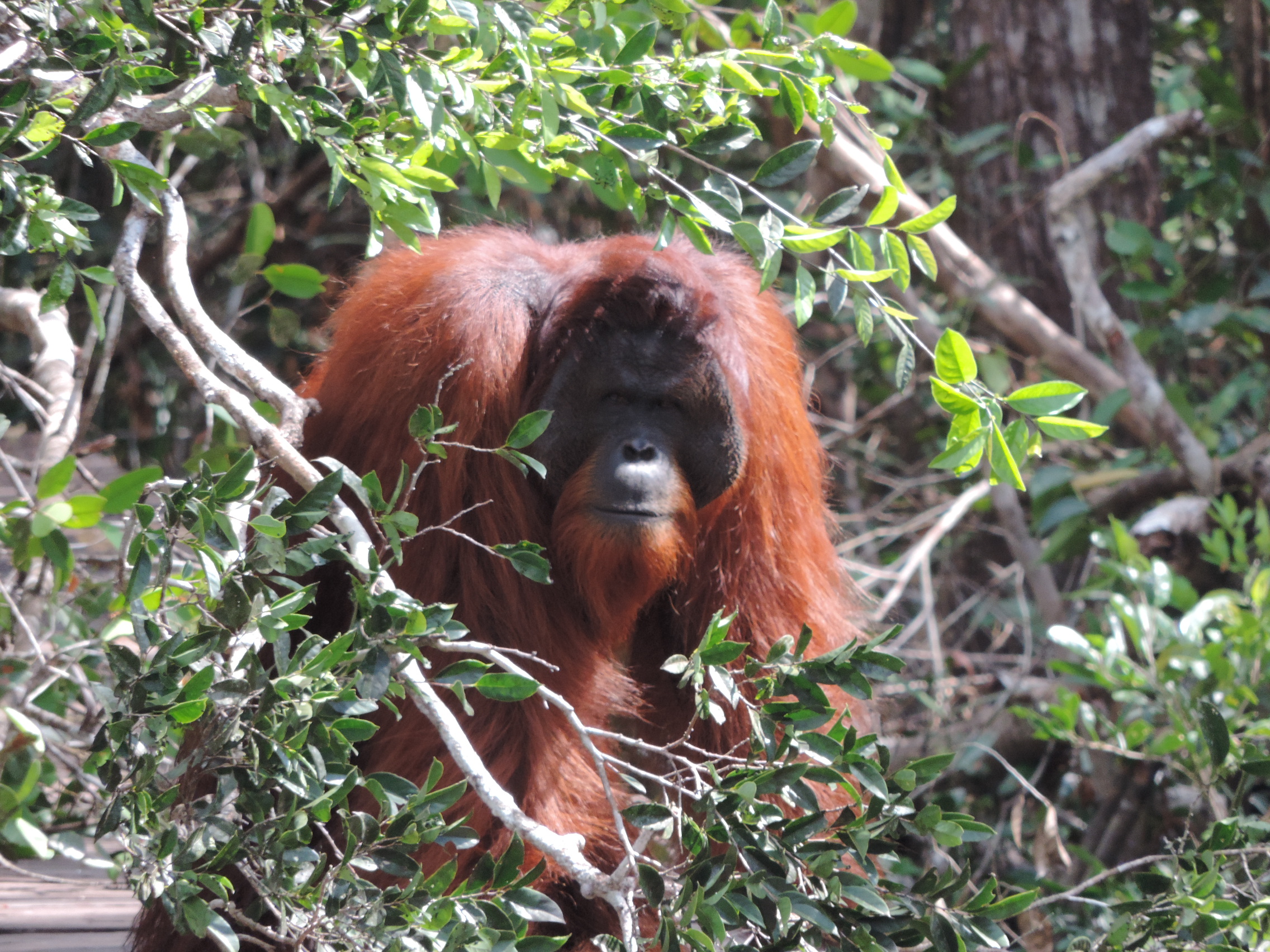
We need your help to continue doing this. If you haven’t already, please consider setting up a regular donation click here to support our vital work. Please also help by sharing this blog post.
Thank you,
From Orangutan Foundation - A future for orangutans, forests and people.
Adult male orangutan shows up at guard post
Some male orangutans start to look very different from females as they reach maturity, from the age of 15 onward. They develop cheek pads and bulk out, some weighing upwards of 120kg, double the average female. In the wild, one cheek-padded male will dominate an area of forest, with other cheek-padded males moving on to an area without another adult male in the vicinity.

Staff stationed at one of our guard posts in the Lamandau Wildlife Reserve, Indonesian Borneo, have reported the arrival of an adult male in the immediate vicinity of the post. Adult male orangutans generally do not pose an immediate threat as they possess a natural wariness of humans, however, this male clearly showed no fear and so was thought to be one that had been rehabilitated into the area.
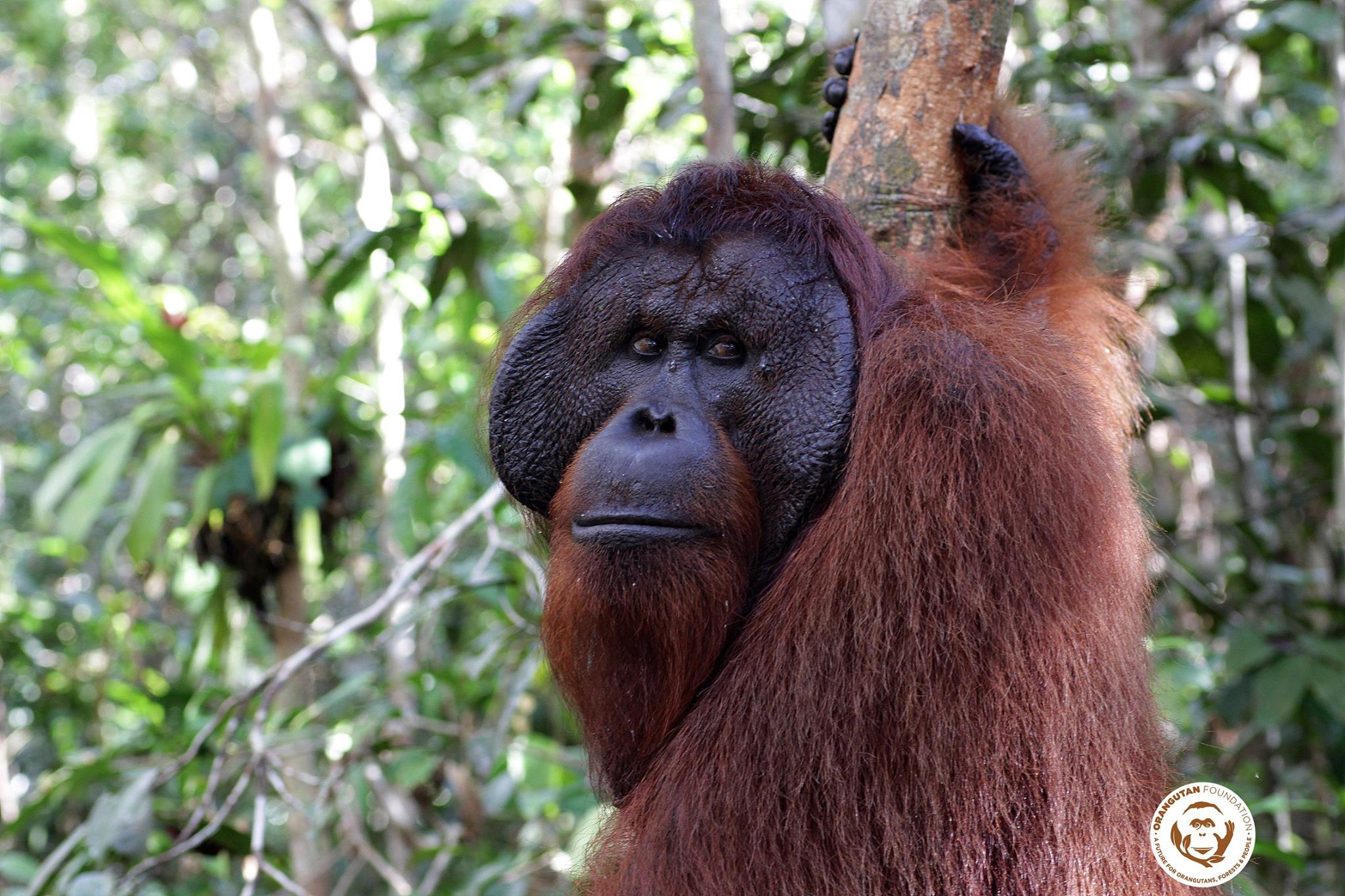
Guard post staff got in touch with staff stationed at the nearby Camp Siswoyo, who identified the male as Ofi, a male often seen in the forest surrounding the camp. Camp staff tried to encourage him to go back into the forest, as he was posing a problem to guard post staff who were unable to move about freely whilst he was close by.
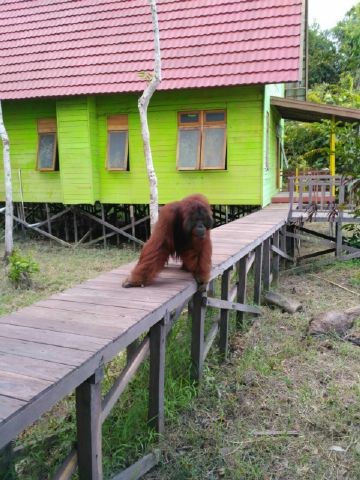
The last time camp staff reported seeing Ofi was back in July this year. Ofi shares the surrounding forest with dominant male Bangkal. Ofi is afraid of Bangkal and will make a swift exit anytime they meet, which is normal behaviour for a submissive male. You can read more about Bangkal here.
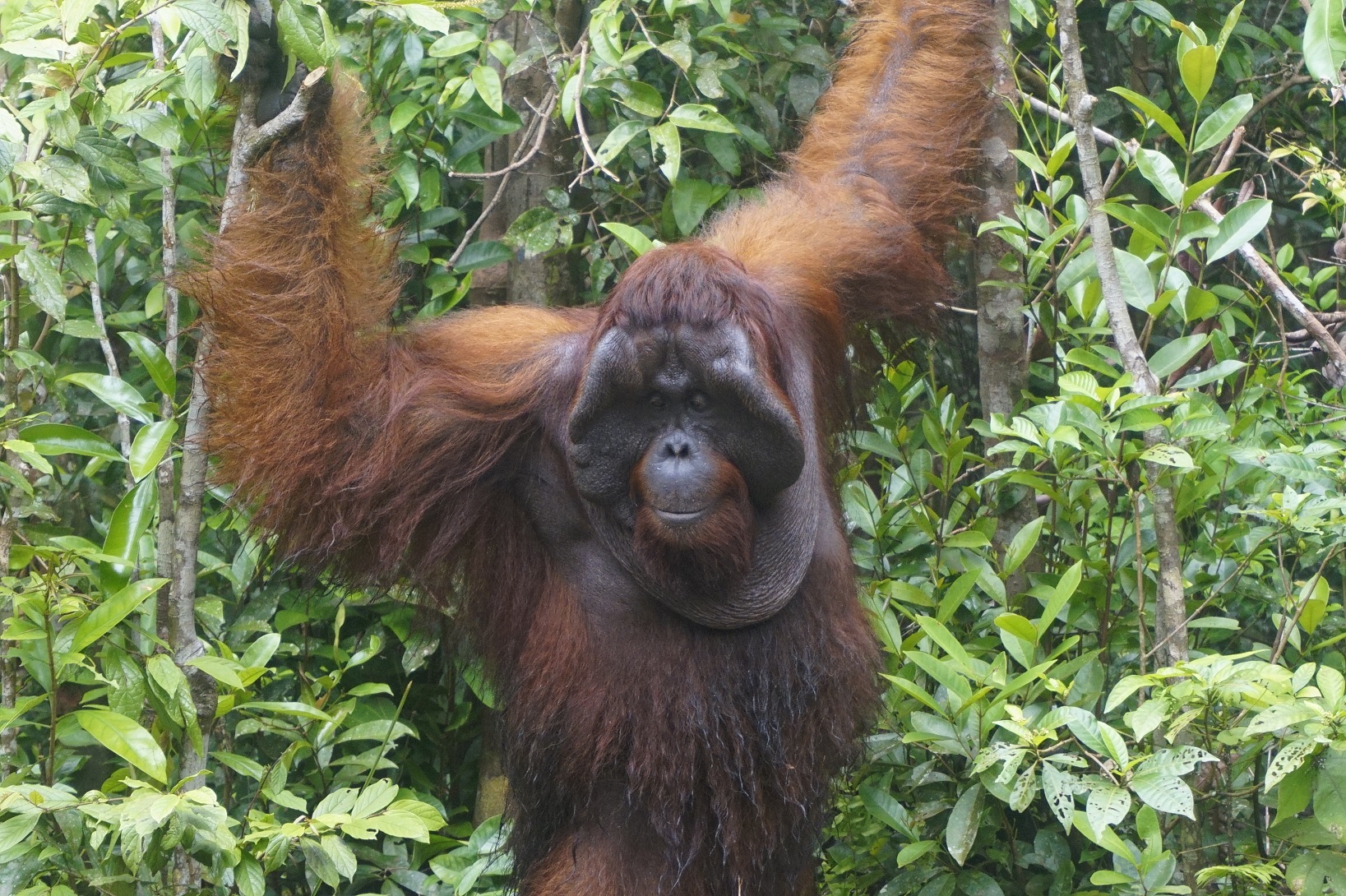
Since the guard post is only 5km away from camp, it is not far for an orangutan to travel, and staff believe he has moved away from camp as he cannot compete with Bangkal. Male orangutans are not territorial and have overlapping ranges, however, they do compete for resources, such as food, and fertile females.
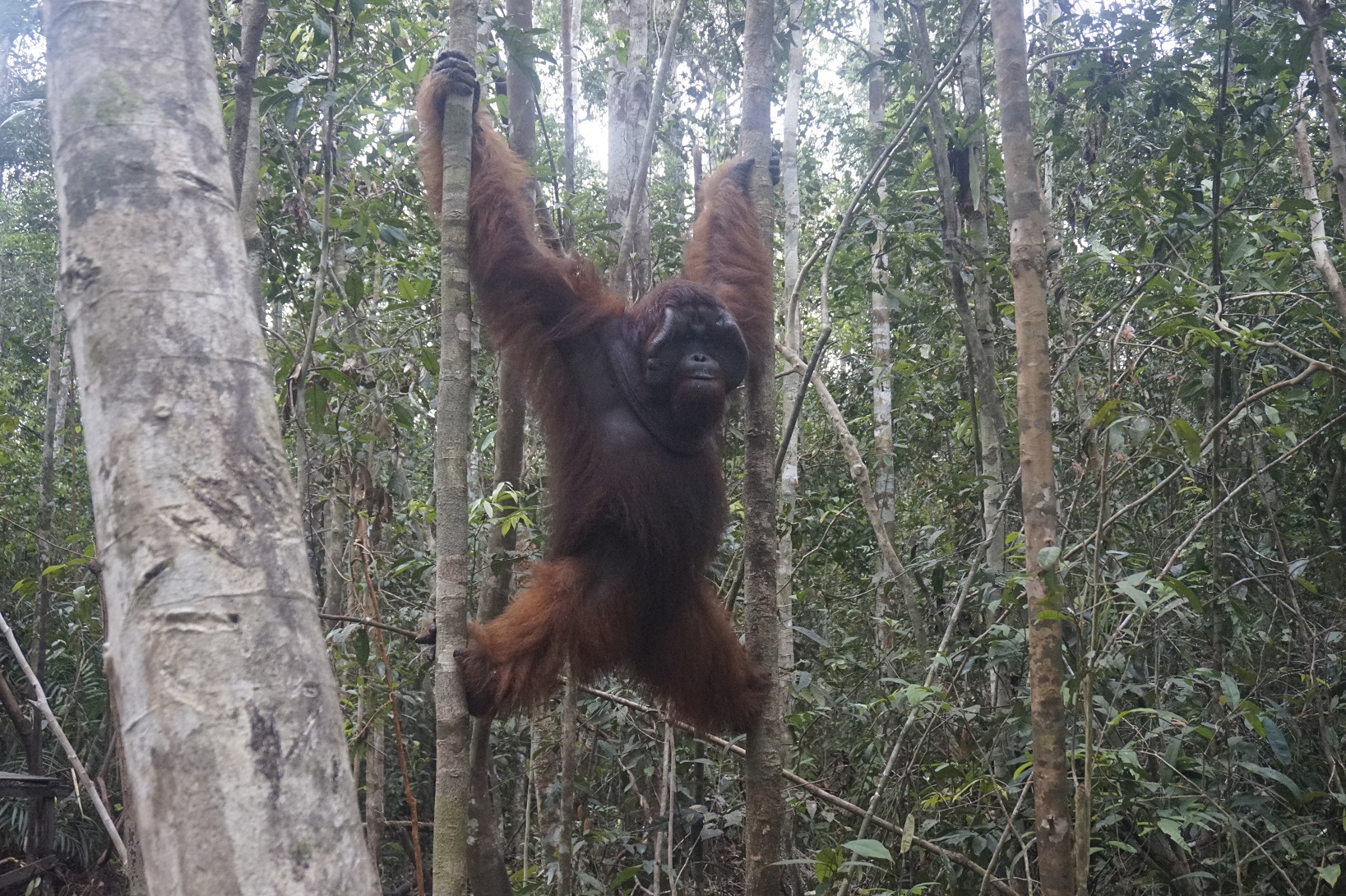
Staff will monitor Ofi and if the situation does not improve, he will be tranquillised and moved into a suitable area of forest away from both camp and the guard post.

It costs £200,000 a year to protect the Lamandau Wildlife Reserve, home to Ofi, Bangkal, and hundreds of other orangutans. Please click here to support our work by giving a donation. Thank you.
Orangutan Foundation on alert for forest fires
Orangutan Foundation have been tackling fires only a few kilometres from the boundary of the Lamandau Wildlife Reserve, home to some 500 critically endangered Bornean orangutans and many other threatened species. Our committed team of Indonesian staff are working with the Indonesian Wildlife Department and the local community to extinguish the fires.

The threat of forest fires is returning as the dry season in Central Kalimantan continues and 2017 looks set to be one of the hottest years on record.
We are prepared and are on alert to ensure these fires do not spread. All of our guard posts store fire fighting equipment and we have supported fire fighting training.

We have witnessed firsthand the devastation caused by fires. During October 2015, fires in Tanjung Puting National Park and the Lamandau Wildlife Reserve burnt through thousands of acres of forests. The clip below, with Indonesian text, highlights the problem.
Forest and land fires can be prevented if all parties support and commit to not burning the forest and land for any purpose.
Support our vital work to ensure a future for orangutans, forests and people.
The Lamandau Wildlife Reserve
We are delighted to be able to convey the news that two of our soft-release orangutans, Jessica and Ketty, have now been released into the Lamandau Wildlife Reserve. Staff are confident both will go on to living fulfilling lives in the wild, free from the threat of habitat loss.


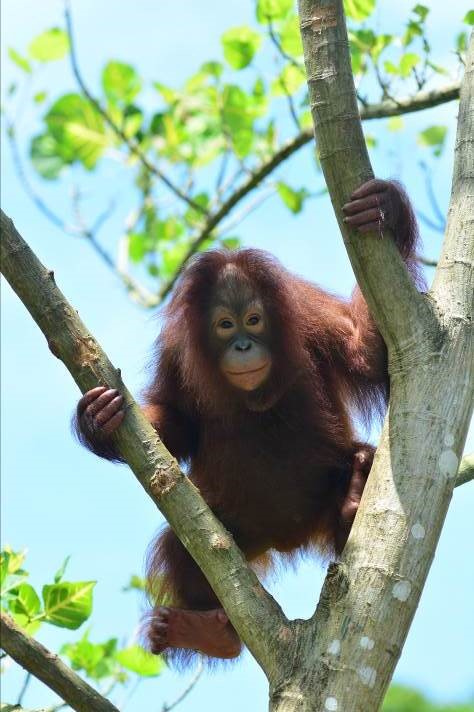
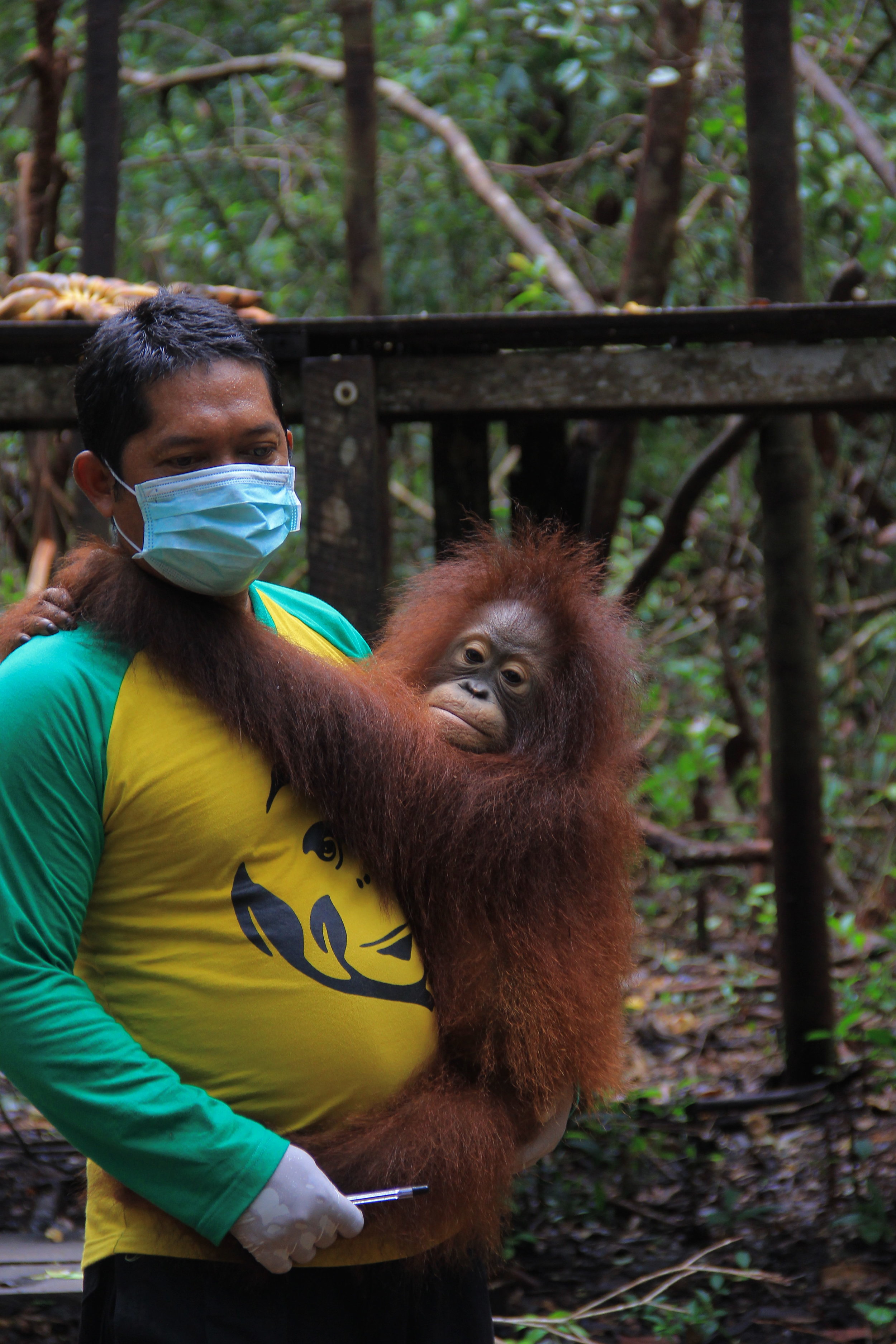
In light of this positive news and #RainforestLive, we are introducing a new initiative in support of the Lamandau Wildlife Reserve.
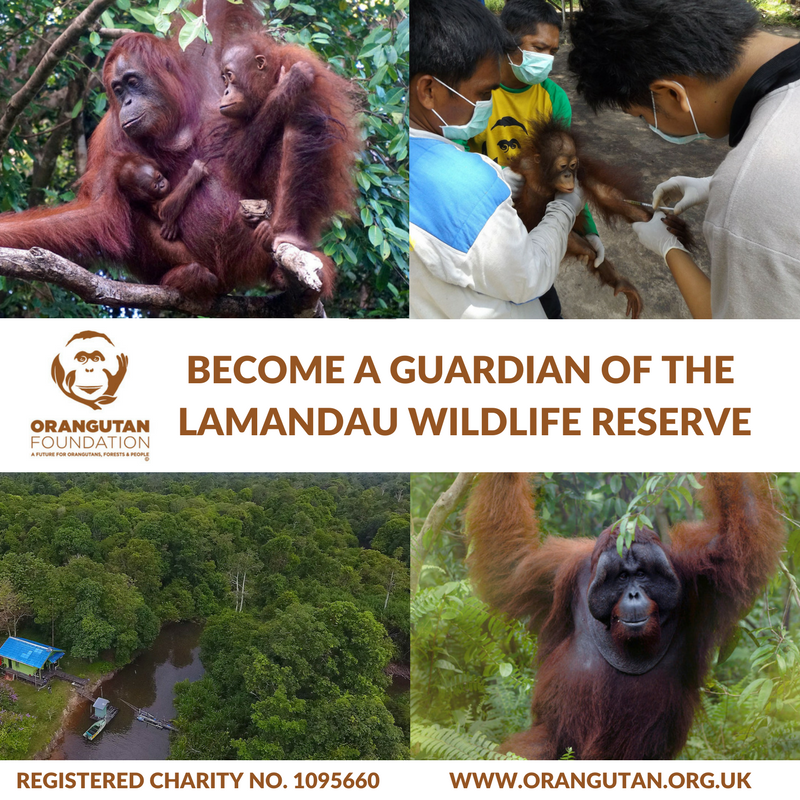
Become a guardian and actively protect:
- 158,144 acres of tropical peat forest in Central Kalimantan, Indonesian Borneo
- 500 critically endangered orangutans - a number which continues to increase as more are rescued and released
- thousands of threatened species including gibbons, sun bears and clouded leopards
- 5 million tonnes of stored carbon.
A regular gift of £16.50 a month or a one-off donation of £200 for the year (the equivalent of 55p a day) will contribute towards the management of the Reserve.
Visit our webpage for more information on how to become a guardian.
The Orangutan Foundation's 5 Programmes in Indonesian Borneo
Watch this short video to learn about our 5 ongoing programmes in Indonesian Borneo:
Please help us ensure a future for orangutans, forests and people. To support our work with a donation, please click here.
Thank you.


